
Quote of the Month
Dec 2022
Leo Tolstoy
"The Three Questions!"
Dec 2021 Mr. Rogers
"You've Got to Do It!"
Dec 2020
Dr. Craig Smith "We Mush On"
Dec 2019
Admiral McRaven "Ten Things I Learned at Navy Seal Training"
Dec 2018
The Walin' Jennys "One Voice"
Dec 2017 Eastwood, Jacob, Sutton "Flying Home" (Sully's
Theme)
May 2017
Wallace & Gleenie-Smith "Mansions of the Lord"
Dec 2016
Margery Williams "The Velveteen Rabbit" or How Toys Become Real!
Aug 2016
"The Olympic Motto" "Olympic Creed" "Scout's Motto"
May 2016 Kent Keith "The Paradoxical Commandments of
Leadership" "Anyway"
Dec 2015 Abraham Lincoln "Civil War Condolence Letter:
Death, Loss and Memory"
Aug 2015 Wisdom
from Dr. Seuss
Apr 2015
Socrates "The Test of Three..."
Dec 2014 "Maybe this time..."
Cabaret, 1972
Aug 2014 Robin Williams,
Dead Poet's Society "Carpe Diem"
Apr
2014 Don Miguel Ruiz "The 4 Agreements"
Dec
2013 Shakespeare "The 7 Ages of Man"
Aug 2013
Anias Nin "hibernating"San Antonio
Apr 2013
H. W. Longfellow "Psalm of Life"
Dec 2012 "this
day's greatest gift"
Aug 2012
L. P. Jacks "working or playing"
Apr 2012
Winne the Pooh "sometimes....."
Dec
2011 Constantine P. Cavafy "Ithica"
August 2011 Sherman Alexie "never slow dance with your
skeletons"
May 2011
Jack LaLanne "LaLanneisms"
Dec 2010 Hans Christian Anderson"The Emperor's New
Clothes"
May-Jun 2010 "Attitude- The Three Hairs"
Jan-Feb
2010 Dean Alfange "My Creed"
Nov-Dec
2009 W. H. Murray "Commitment"
July-August 2009 Albert Maltz "Indian Wedding Prayer"
May-June 2009 Dorthea Brande "The Will to Fail"
Mar-Apr 2009
James Redfield "The Tenth Insight" "Together we are
going somewhere"
Jan-Feb 2009
William Ernest Henley "Invictus"
Nov-Dec 2008 Jack London "Jack London's Credo"
Aug-Sep 2008 David Foster and Carol Sager "The Prayer"
Jun-Jul 2008 John Mitchum and John Wayne "America, Why
I Love Her"
Apr 2008 Richard Bach "Jonathan Livingston Seagull"
Feb 2008 Antonio Carlos Jobim "Corcovado, Quiet Nights of
Quiet Stars"
Dec 2007 Lewis Carroll "...the happy summer days."
Oct-Nov 2007 Benjamin Franklin "The 13 Virtues..."
Aug-Sep 2007 D'Invilliers "Then wear the gold hat..."
Mar-Apr 2007 Dr. Christian "As i drove i found Spring"
Jan-Feb 2007 England Dan & John Ford Coley "I'd really
love to see you tonight"
Nov-Dec 2006 Robert Frost "The Road Not Taken"
Sep-Oct 2006 Barbara Streisand "Putting It Together"
Jul-Aug 2006 Theodore Roosevelt "The Man in the Arena"
June 2006
Max Ehrmann "Desiderata"
May 2006
Alan Cohen
"the Main Thing.."
April 2006 Henry David
Thoreau "If one advances confidently..."
February 2006 Elizabeth
Barrett Browning "How do i love thee.."
January 2006 James Allen "You will be what you will to be..."
December 2005 Dr. Bernie Segal, "We'll See"
November 2005 Steve Jobs,
"You've got to find what you love"
September 2005 Og Mandino "I will greet this day with love
in my heart..."
August 2005 "Adventure" Gandalf and Bilbo, the
Hobbit.
July
2005 Rudyard Kipling "If...."
June 2005
John Donne "No Man is an Island" "Death Be Not Proud"
May 2005 George Washington "Washington's Order on Profanity"
April 2005
Kalidasa Indian Poet "The Salutation of the Dawn"
March 2005
R. L. Sharp "A Bag of Tools"
February 2005 Douglas MacArthur "Duty, Honor, Country"
January 2005 William Osler M.D. "A Way of Life"
December 2004 Leo Tolstoy "What Men Live By" "The Three Lessons of God"
November
2004 Martin Buber "There are those who"
October
2004 Benjamin Franklin "On Death"
September 2004 Marianne Williamson "Our Deepest Fear"
August 2004
Audrey Hepburn "Beauty"
Dec 2022
Leo Tolstoy "The Three Questions"
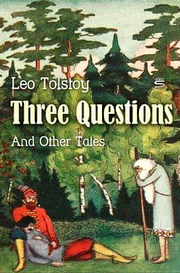
"IT
ONCE OCCURRED TO A CERTAIN KING that IF he always knew the
right time to begin everything; IF he knew who were the
right people to listen to, and whom to avoid; and, above
all, IF he always knew what was the most important thing to
do, he would never fail in anything he might undertake. And,
this thought having occurred to him, he had it proclaimed
that throughout his kingdom that he would give a great
reward to anyone who could teach him what was the right time
for every action, and who were the most necessary people,
and how he might know what was the most important thing to
do."
The King finally went to a wise hermit who gave him this answer.
"Remember then: there is only one time that is important, Now! It is
the most important time because it is the only time we have any
power. The most necessary person is the one with whom you are, for
no man knows whether he will ever have dealings with anyone else:
and the most important affair is to do that person good, because for
that purpose alone was man sent into this life."
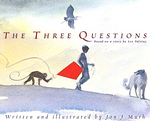
Childrens' Picture Book by
Jon J. Mugh
Dec 2021 Mr.
Rogers "You've Got to Do It"
|
You can make-believe it happens, or pretend
that something’s true.
You can wish or hope or contemplate a thing
you’d like to do,
But until you start to do it, you will never
see it through
‘Cause the make-believe pretending just
won’t do it for you.
You’ve got to do it.
Every little bit, you’ve got to do it, do
it, do it, do it
And when you’re through, you can know who
did it
For you did it, you did it, you did it.
If you want to ride a bicycle and ride it
straight and tall,
You can’t simply sit and look at it ’cause
it won’t move at all.
But it’s you who have to try it, and it’s
you who have to fall (sometimes)
If you want to ride a bicycle and ride it
straight and tall.
You’ve got to do it.
Every little bit, you’ve got to do it, do
it, do it, do it
And when you’re through, you can know who
did it
For you did it, you did it, you did it.
If you want to read a reading book and read
the real words too,
You can’t simply sit and ask the words to
read themselves to you.
But you have to ask a person who can show
you one or two
If you want to read a reading book and read
the real words, too.
You’ve got to do it.
Every little bit, you’ve got to do it, do
it, do it, do it
And when you’re through, you can know who
did it
For you did it, you did it, you did it.
It’s not easy to keep trying, but it’s one
good way to grow.
It’s not easy to keep learning, but I know
that this is so:
When you’ve tried and learned you’re bigger
than you were a day ago.
It’s not easy to keep trying, but it’s one
way to grow.
You’ve got to do it.
Every little bit, you’ve got to do it, do
it, do it, do it
And when you’re through, you can know who
did it
For you did it, you did it, you did it.
"You've Got to Do It" 1981
Music and Lyrics by
Fred M. Rogers
 misterrogers.org
website misterrogers.org
website
EXTRA: Hear Mr. Rogers speak at a Senate Subcommittee in 1969
about "What do you do with the Mad that you feel?"
|
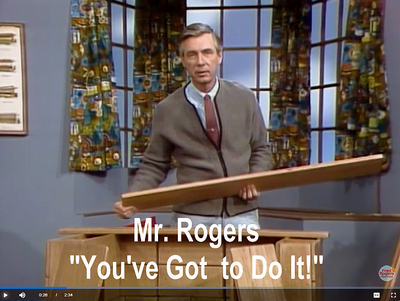

Tom Hanks as Mr. Rogers at
Amazon!
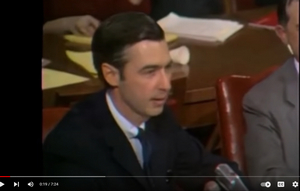 |
Dec 2020
Dr. Craig Smith "We Mush On"
The COVID-19 crisis has been shared eloquently by Dr. Craig
Smith, Chief of Surgery at Columbia New York Presbyterian,
one of the first "hospital hotspots" in the United States.
He has become one of the Pandemic Poets. Please read his
letter of
20 Mar 20
in which he describes the dire situation at his hospital.
This was the 3rd week of the crisis in the US. By now, none
of us should have a problem understanding what he is writing
about. Here is the last paragraph.
"The next month or two
is a horror to imagine if we're underestimating the threat.
So what can we do? Load the sled, check the traces, feed
Balto, and mush on. Our cargo must reach Nome. Remember
that our families, friends, and neighbors are scared, idle,
out of work, and feel impotent. Anyone working in health
care still enjoys the rapture of action. It’s a privilege!
We mush on."
Dr. Craig Smith, 20 Mar 20 "We Mush
On" Columbia Website
Dec 2019
Admiral McRaven "10 Things I Learned at Navy Seal
Training"
|
University of Texas at
Austin
2014 Commencement Address
1. Start each day with a task
completed. Make your bed,
2. Find someone to help you
through life,
3. Respect everyone,
4. Know that life is not
fair,
5.
Know you will fail often,
6. Take some risks,
7. Step up when the times are
the toughest,
8. Face the bullies,
9.
Lift
up the downtrodden,
10. And, Never, ever give
up…..
Admiral William McRaven at
Wikipedia
|
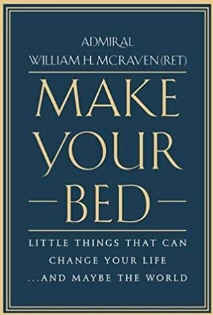 |
Dec 2018
The Wailin' Jennys "One Voice"
|
This is the sound of
one voice
One spirit, one voice
The sound of one who
makes a choice
This is the sound of
one voice
This is the sound of
one voice
This is the sound of
voices two
The sound of me singing
with you
Helping each other to make
it through
This is the sound of
voices two
This is the sound of
voices two
This is the sound of
voices three
Singing together in
harmony
Surrendering to the
mystery
This is the sound of
voices three
This is the sound of
voices three
This is the sound of all
of us
Singing with love and the
will to trust
Leave the rest behind it
will turn to dust
This is the sound of all
of us
This is the sound of all
of us
This is the sound of one
voice
One people, one voice
A song for every one of us
This is the sound of one
voice
This is the sound of one
voice
The
Wailin' Jennys
Lyrics by Ruth Moody
|

|
Dec 2017 Eastwood, Jacob, Sutton "Flying Home" (Sully's
Theme)
|
tell me your story. i'll tell you mine.
sing me your song. i'll follow line by line.
draw me near let me hear the things you've
treasured.
patient as falling snow standing inside the
questions.
i'll be guessing by what truths our souls are measured.
each of us rising from worlds unknown.
within your trials i'll see my own.
still there are journey's that are yours alone.
you were born for the storm you have to
weather.
true as the winter wind you faced moment
bravely.
you and i we're on our own and yet together.
walking a path we can't define.
tell me your story. i'll tell you mine.
sing me your song. i'll follow line by line.
let the night fall with the lightness of a
feather.
trusting the coming dawn.
we can not hold the morning.
you and i we're on our own and yet together.
for in the end. we'll all flying home.
Clint Eastwood, Jacob Christian and
Tierney Sutton Band
|
Sully
(also known as Sully: Miracle on
the Hudson[)
is a 2016 American biographical drama
film directed by
Clint Eastwood and written by Todd
Komarnicki, based on the autobiography
Highest Duty by
Chesley Sullenberger and
Jeffrey Zaslow. The film stars
Tom Hanks as Sullenberger, with
Aaron Eckhart,
Laura Linney,
Anna Gunn,
Autumn Reeser,
Holt McCallany,
Jamey Sheridan, and
Jerry Ferrara in supporting roles.
The film follows Sullenberger's January
2009 emergency landing of
US Airways Flight 1549 on the
Hudson River, in which all 155
passengers and crew survived with only
minor injuries, and the subsequent
publicity and investigation.
Sullenberger is a graduate of the
United States Air Force Academy Class of
1973.
From Wikipedia
|
May
2017 Wallace & Gleenie-Smith "Mansions of the
Lord"
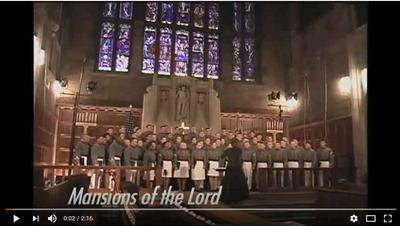
To fallen soldiers let us
sing
Where no rockets fly nor bullets wing
Our broken brothers let us bring
To the Mansions of the Lord
No more bleeding, no
more fight
No prayers pleading through the night
Just divine embrace, Eternal light
In the Mansions of the Lord
Where no mothers cry
and no children weep
We will stand and guard though the
angels sleep
All through the ages safely keep.
From Wikepedia :"Mansions
of the Lord"
is a hymn written by
Randall Wallace and set to the music
of
Nick Glennie-Smith
"Mansions" was
originally written for the 2002 film
We Were Soldiers, We Were
Soldiers is a 2002 war film that
dramatizes the
Battle of Ia Drang on November 14,
1965. The film was directed by Randall
Wallace and stars Mel Gibson. It is
based on the book
We Were Soldiers Once… And Young
(1992) by
Lieutenant General (Ret.) Hal Moore
and reporter
Joseph L. Galloway, both of whom
were at the battle.
Dec
2016 Margery Williams "The Velveteen Rabbit" or How Toys Become Real
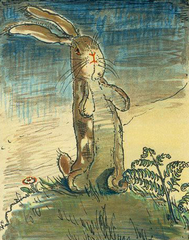
The Skin Horse had lived
longer in the nursery than any of the others. He was so old
that his brown coat was bald in patches and showed the seams
underneath, and most of the hairs in his tail had been
pulled out to string bead necklaces. He was wise, for he had
seen a long succession of mechanical toys arrive to boast
and swagger, and by-and-by break their mainsprings and pass
away, and he knew that they were only toys, and would never
turn into anything else. For nursery magic is very strange
and wonderful, and only those playthings that are old and
wise and experienced like the Skin Horse understand all
about it.
"What is REAL?" asked the Rabbit one day, when they were
lying side by side near the nursery fender, before Nana came
to tidy the room. "Does it mean having things that buzz
inside you and a stick-out handle?"
"Real isn't how you are made," said the Skin Horse. "It's a
thing that happens to you. When a child
loves you for a
long, long time, not just to play with, but REALLY loves
you, then you become Real."
"Does it hurt?" asked the Rabbit.
"Sometimes," said the Skin Horse, for he was always
truthful. "When you are Real you don't mind being hurt."
"Does it happen all at once, like being wound up," he asked,
"or bit by bit?"
"It doesn't happen all at once," said the Skin Horse. "You
become. It takes a long time. That's why it doesn't happen
often to people who break easily, or have sharp edges, or
who have to be carefully kept. Generally, by the time you
are Real, most of your hair has been loved off, and your
eyes drop out and you get loose in the joints and very
shabby. But these things don't matter at all, because once
you are Real you can't be ugly, except to people who don't
understand."
Margery Williams "The
Velveteen Rabbit" 1922
The Velveteen Rabbit at Wikipedia
Read Online at
Project Gutenberg.org with Illustrations
Aug 2016 "The
Olympic Creed", "Olympic Motto", "Scout Motto", and "The
Fields of Friendly Strife", "Coast Guard Motto" & "Texas Motto"

The Olympic Creed "The
most important thing in the Olympic Games is not to win but
to take part, just as the most important thing in life is
not the triumph but the struggle. The essential thing is not
to have conquered but to have fought well."
Pierre de Coubertin got the idea for the phrase adopted as
the Olympics Creed from a speech given by Bishop Ethelbert
Talbot at a service for Olympic champions during the 1908
Olympic Games.
The Olympic Motto "Citius,
Altius, Fortius" "Faster, Higher, Stronger"
friend of Baron Pierre de Coubertin, Father Henri Martin
Didon of the Dominican order, was the principal of Arcueil
College, near Paris. An energetic teacher, he used the
discipline of sport as a powerful educational tool. One day,
following an inter-school athletics meeting, Didon ended his
speech quoting three Latin words: Citius, Altius, Fortius
(Faster, Higher, Stronger). Struck by the succinctness of
this phrase, Baron Pierre de Coubertin made it the Olympic
motto, pointing out that "Athletes need 'freedom of excess.'
That is why we gave them this motto...a motto for people who
dare to try to break records."


The Scouts Motto "Allzeit
Bereit" "Be Prepared"
- Be Prepared in Mind
by having disciplined yourself
to be obedient to every order,
and also by having thought out
beforehand any accident or
situation that might occur, so
that you know the right thing to
do at the right moment, and are
willing to do it.
- Be Prepared in Body
by making yourself strong and
active and able to do the right
thing at the right moment, and
do it.
Hilary Saint George Saunders' book The
Left Handshake: The Boy Scout Movement during the War,
1939-1945 had the first letter of each chapter spell out
the Scout motto. The chosen words are: Bravery, Enterprise,
Purpose, Resolution, Endurance, Partnership,
Assurance, Reformation, Enthusiasm and
Devotion.
The Fields of Friendly Strife
"On the fields of friendly strife
are sown the seeds that on other days and other fields will
bear the fruits of victory" General Douglas McArthur
The Coast Guard Motto
"Semper Paratus" Always Ready!
The Official Coast Guard Marching Song
The
Life and Death Brigade Motto
"In Omnia Paratus" "Prepared for
all things".
Gilmore Girls "You Jump, I Jump Jack"
Season 5, Episode
7, 2 Nov 2004
The Texas Motto
"Equidae Ocius, Femina Terra, J. Danielus Pristinus,
Amplius Pecunia" "Faster Horses, Younger
Women, Older Whisky, More Money!"
Tom T. Hall
"Faster Horses (The Cowboy
and the Poet)" 1975
May 2016 Kent Keith "The Paradoxical Commandments of
Leadership" "Anyway"
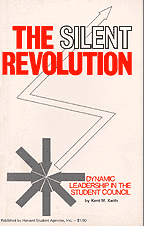
- People are illogical,
unreasonable, and self-centered. Love them
anyway.
- If you do good, people
will accuse you of selfish ulterior motives. Do
good anyway.
- If you are successful, you
win false friends and true enemies. Succeed
anyway.
- The good you do today will
be forgotten tomorrow. Do good anyway.
- Honesty and frankness make
you vulnerable. Be honest and frank anyway.
- The biggest men with the
biggest ideas can be shot down by the smallest
men with the smallest minds. Think big anyway.
- People favor underdogs,
but follow only top dogs. Fight for a few
underdogs anyway.
- What you spend years
building may be destroyed overnight. Build
anyway.
- People really need help
but may attack you if you do help them. Help
people anyway.
- Give the world the best
you have and you'll get kicked in the teeth.
Give the world the best you have anyway.
Kent Keith 1968 "The Silent Revolution"
Kent
Keith
The Mother Teresa Connection to The Paradoxical
Commandments of Leadership
"According to Lucinda Vardey,
in Mother Teresa: A Simple Path (New York:
Ballantine Books, 1995), page 185, there was "a sign on the
wall of Shishu Bhavan, the children's home in Calcutta."
This is what the sign said:"
People
are often unreasonable, irrational,
and self-centered. Love
them anyway.
If
you do good, people may accuse you of selfish,
ulterior motives. Be good anyway.
If
you are successful, you will win false
friends and true enemies.
Succeed anyway.
The
good you do today, will often be forgotten. Do
good anyway.
Honesty and
frankness may make you vulnerable.
Be honest and frank anyway.
What
you spend years building may be destroyed
overnight. Build anyway.
People
really need help but may attack you if you help
them. Help people anyway.
Give
the world the best you have, and you'll get kicked
in the teeth.
Give the world the best you've got anyway.
The Mother Teresa Connection to The Paradoxical
Commandments of Leadership by Kent Kieth
The Final Analysis
Version attributed to Mother Teresa seen often on
the internet is:

Do Good Anyway. The Paradoxical Commandments I Quote
Investigator

US Air Force Academy Center for Character and
Leadership Development!


US Air Force Academy Center for Character and
Leadership Development! Review of Building
it!
Dec 2015 Abraham Lincoln "Civil War Condolence Letter:
Death, Loss and Memory"
By the end of 1862, the
tragic immensity of the war’s carnage had settled into fact,
and Lincoln had already written a number of painful letters
of consolation. None, however, spoke more eloquently
to the searing devastation of loss, and the haunting promise
of solace, than the 166 words he penned to twenty-two year
old Fanny McCullough.
Executive Mansion,
Washington, December 23, 1862.
Dear Fanny
It is with deep grief that I learn of
the death of your kind and brave Father;
and, especially, that it is affecting your
young heart beyond what is common in such
cases. In this sad world of ours, sorrow
comes to all; and, to the young, it comes
with bitterest agony, because it takes them
unawares. The older have learned to ever
expect it. I am anxious to afford some
alleviation of your present distress.
Perfect relief is not possible, except with
time. You can not now realize that you will
ever feel better. Is not this so? And yet it
is a mistake. You are sure to be happy
again. To know this, which is certainly
true, will make you some less miserable now.
I have had experience enough to know what I
say; and you need only to believe it, to
feel better at once. The memory of your dear
Father, instead of an agony, will yet be a
sad sweet feeling in your heart, of a purer
and holier sort than you have known before.
Please present my kind regards to your
afflicted mother.
Your sincere friend
A. Lincoln

Original Handwritten letter
available at Shapell Manuscript Collection
Aug 2015
Wisdom from Dr. Seuss

“Today is your day! Your mountain is waiting, so…get
on your way!”
"A person's a person, no matter how small.”
"Today was good. Today was fun. Tomorrow is another
one.”
“You have brains in your head. You have feet in your
shoes. You can steer yourself any direction you
choose.”
“Unless someone like you cares a whole awful lot,
nothing is going to get better. It’s not.”
“Oh the things you can find if you don’t stay
behind.”
“Think and wonder. Wonder and think.”
"And when things start to happen, don’t worry. Don’t
stew. Just go right along, you’ll start happening
too!”
“Today you are you, that is truer than true. There
is no one alive who is youer than you.”
“You'll miss the best things if you keep your eyes
shut.”
Idea
and images's from Huffington Post
Dr. Seuss's Prescription for a bad day.
Seussville
Official Random House Web Site
Dr. Seuss at Wikipedia
Apr 2015
Socrates "The Test of Three"
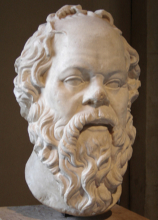
Keep this philosophy in mind the next time you hear,
or are about to repeat a rumor: In ancient Greece
(469 - 399 BC), Socrates was widely lauded for his
wisdom.
One day the great philosopher came upon an
acquaintance, who ran up to him excitedly and said,
"Socrates, do you know what I just heard about one
of your students...?"
"Wait a moment,"
Socrates replied. "Before you tell me, I'd like you
to pass a little test. It's called the Test of
Three."
"Test of Three?"
"That's correct,"
Socrates continued.
Before you talk to me about my student let's take a
moment to test what you're going to say."
The first test isTruth.
"Have you made absolutely sure that what you are
about to tell me is true?"
"No," the man replied, "actually I just heard about
it."
"All right," said Socrates. "So you don't really
know if it's true or not. Now let's try..
The second test, the test of Goodness.
"Is what you are about to tell me about my student
something good?"
"No, on the contrary..."
"So, Socrates continued, you want to tell me
something bad about him even though you're not
certain it's true?"
The man shrugged, a little embarrassed.
Socrates continued, "You may still pass though
because there is a...
The third test - the filter of Usefulness.
"Is
what you want to tell me about my student going to
be useful to me?"
"No, not really..."
"Well," concluded Socrates, "if what you want to
tell me is
neither True nor Good nor even Useful,
why tell it to me at all?"
The man was defeated and ashamed and said no more.
Socrates at Wikipedia
Dec 2014 "Maybe
this time" Cabaret 1972
 Glee Lyrics
2009
Glee Lyrics
2009
Kristen Chenoweth -
April,
Lea Michele - Rachel
[April]
Maybe this time,
I'll be lucky
Maybe this time
He'll stay
Maybe this time
For the first time
Love won't hurry away
He will hold me fast
I'll be home at last
Not a loser anymore
Like the last time
And the time before
[Rachel]
Everybody loves a winner
[April]
So nobody loved me
Lady peaceful, Lady happy
That's what I want to be
All of the odds are
They're in my favor
[Rachel]
Something's bound to begin
[April]
It's gotta happen
[Rachel]
Happen sometime
[April]
Maybe this time I'll win
[Rachel]
Cuz
Everybody they love a winner
[April]
So nobody loved me
[Rachel]
Lady peaceful, Lady happy
That's what I want to be
[April]
All of the odds are
They're in my favor
[Rachel]
Something's bound to begin
[April]
It's gotta happen
[Rachel]
Happen sometime
[Rachel and April, starting at
different times]
Maybe this time I'll win
[April]
Winnnnn!!!
Music - John Kander
Lyrics - Fred Ebb
|
GLEE - Maybe This Time (Full Performance)
(Official Music Video) HD
Kristen Chenoweth "Maybe This Time"
NewNowNext Awards 2014

The
Original Liza Minnelli "Maybe This Time"
Cabaret 1972
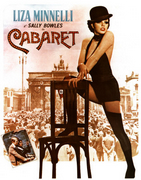 |
Aug 2014 Robin Williams "Carpe diem"
Dead Poet's Society 1989
"Gather ye rosebuds while ye may.'
The Latin term for that sentiment is Carpe Diem. Now
who knows what that means?...Seize the day. Gather
ye rosebuds while ye may. Why does the writer use
these lines? ...Because we are food for worms, lads. Because, believe it or not, each and every one of us
in this room is one day gonna stop breathing, turn
cold, and die.
Now I would like you to step
forward over here and peruse some of the faces from
the past. You've walked past them many times. I
don't think you've really looked at them. They're
not that different from you, are they? Same
haircuts. Full of hormones, just like you. Invincible, just like you feel. The world is their
oyster. They believe they're destined for great
things, just like many of you. Their eyes are full
of hope, just like you. Did they wait until it was
too late to make from their lives even one iota of
what they were capable? Because you see gentlemen,
these boys are now fertilizing daffodils. But if you
listen real close, you can hear them whisper their
legacy to you.
Go on, lean in. Listen. Do you hear
it? (whispering in a gruff voice) Carpe. Hear
it? (whispering) Carpe.
Carpe Diem. Seize the
day boys. Make your lives extraordinary."
Robin Williams as Welton Academy
English teacher John Keating in " Dead Poets Society
(1989)
To
the Virgins, to Make Much of Time
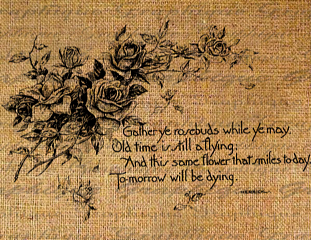 Gather
ye rosebuds while ye may,
Gather
ye rosebuds while ye may,
Old Time is still a-flying;
And this same flower that smiles today
Tomorrow will be dying.
The glorious lamp of heaven, the sun,
The higher he’s a-getting,
The sooner will his race be run,
And nearer he’s to setting.
That age is best which is the first,
When youth and blood are warmer;
But being spent, the worse, and worst
Times still succeed the former.
Then be not coy, but use your time,
And while ye may, go marry;
For having lost but once your prime,
You may forever tarry.
Robert Herrick 17th
Century
Apr 2014 Don
Miguel Ruiz "The
4 Agreements"
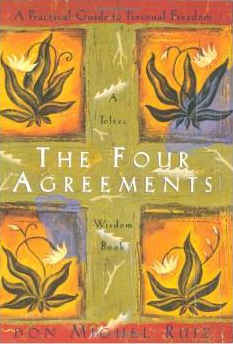
1. Be Impeccable with
your Word:
Speak with integrity.
Say only what you mean.
Avoid using the Word to
speak against yourself
or to gossip about
others. Use the power of
your Word in the
direction of truth and
love.
2. Don’t Take
Anything Personally
Nothing others do is
because of you. What
others say and do is a
projection of their own
reality, their own
dream. When you are
immune to the opinions
and actions of others,
you won’t be the victim
of needless suffering.
3. Don’t Make
Assumptions
Find the courage to ask
questions and to express
what you really want.
Communicate with others
as clearly as you can to
avoid misunderstandings,
sadness and drama. With
just this one agreement,
you can completely
transform your life.
4. Always Do
Your Best
Your best is going to
change from moment to
moment; it will be
different when you are
healthy as opposed to
sick. Under any
circumstance, simply do
your best, and you will
avoid self-judgment,
self-abuse, and regret.

Dec 2013 Shakespeare "The
7 Ages of Man"
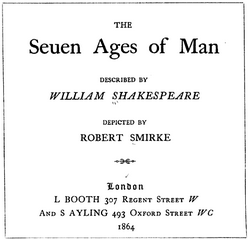
All the
world’s a stage,
And all the men and women merely players;
They have their exits and their entrances,
And one man in his time plays many parts,
His acts being
seven ages.
1 At first the infant,
Mewling and puking in the nurse’s arms;
2 And then the whining schoolboy,
with
his satchel and shining morning face, creeping like snail
unwillingly to school.
3
And
then the lover,
Sighing like furnace, with a woeful ballad
Made to his mistress’ eyebrow.
4
Then
a soldier,
Full of strange oaths, and bearded like the pard,
Jealous in honor, sudden and quick in quarrel,
Seeking the bubble reputation even in the cannon’s
mouth.
5
And
then the justice,
In fair round belly with good capon lined,
With eyes severe and beard of formal cut,
Full of wise saws and modern instances; And so he
plays his part.
6
The
sixth age shifts
Into the lean and slippered pantaloon,
With spectacles on nose and pouch on side;
His youthful hose, well saved, a world too wide
For his shrunk shank; and his big manly voice,
Turning again toward childish treble, pipes and
whistles in his sound.
7 Last scene of all,
That ends this strange eventful history,
Is second childishness and mere oblivion,
Sans teeth, sans eyes, sans taste, sans everything.
Monologue from William Shakespeare's
As You Like It, spoken by the melancholy Jaques in
Act II Scene VII.
Aug 2013 Anias
Nin "hibernating"
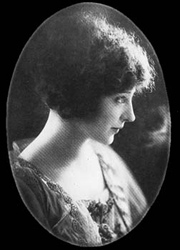 “You
live like this, sheltered, in a delicate world, and you
believe you are living. Then you read a book (Lady
Chatterley, for instance), or you take a trip, or you talk
with Richard, and you discover that you are not living, that
you are hibernating.
“You
live like this, sheltered, in a delicate world, and you
believe you are living. Then you read a book (Lady
Chatterley, for instance), or you take a trip, or you talk
with Richard, and you discover that you are not living, that
you are hibernating.
The symptoms of hibernating are easily
detectable: first, restlessness. The second symptom (when
hibernating becomes dangerous and might degenerate into
death): absence of pleasure.
That is all. It appears like an innocuous
illness. Monotony, boredom, death. Millions live like this
(or die like this) without knowing it.
They work in offices. They drive a car.
They picnic with their families. They raise children.
And then some shock treatment takes place,
a person, a book, a song, and it awakens them and saves them
from death. Some never awaken”
The Diary of Anais Nin, Vol. 1:1931-1934
French Born author 1903-1977
Anais Nin
Wikipedia
Apr 2013 H.
W. Longfellow "A Psalm of Life"
WHAT THE HEART OF THE YOUNG MAN
SAID TO THE PSALMIST
Tell me not in
mournful numbers,
Life is but an empty dream!
For the soul is dead that slumbers,
And things are not what they seem.
Life is real! Life is earnest!
And the grave is not its goal;
Dust thou are, to dust thou returnest,
Was not spoken of the soul.
Not enjoyment, and not sorrow,
Is our destined end or way;
But to act, that each tomorrow
Find us farther than today.
Art is long, and Time is fleeting,
And our hearts, though stout and brave,
Still, like muffled drums, are beating
Funeral marches to the grave.
In the world's broad field of battle,
In the bivouac of Life,
Be not like dumb, driven cattle!
Be a hero in the strife!
Trust no Future, howe'er pleasant!
Let the dead Past bury its dead!
Act, - act in the living Present!
Heart within, and God o'erhead!
Lives of great men all remind us
We can make our lives sublime,
And, departing, leave behind us
Footprints on the sand of time;
Footprints, that perhaps another,
Sailing o'er life's solenm main,
A forlorn and shipwrecked brother,
Seeing, shall take heart again.
Let us then be up and doing,
With a heart for any fate;
Still achieving, still pursuing,
Learn to labor and to wait.
Henry Wadsworth Longfellow (February 27, 1807 – March
24, 1882) was an American poet and educator whose works
include "Paul
Revere's Ride",
The Song of Hiawatha, and
Evangeline. He was also the first American to
translate
Dante Alighieri's
The Divine Comedy and was one of the five
Fireside Poets. From Wikipedia.
The above poem was first published in the
Knickerbocker Magazine in October 1838. It also
appeared in Longfellow's first published collection
Voices in the Night. It can be found, for
example, in: Longfellow, Henry Wadsworth. The
Complete Poetical Works of Longfellow. Boston:
Houghton Mifflin Company, 1893.
From Poem of the Week.
Psalm of Life - H. W. Longfellow (by Paul
Scofield) YouTube
Dec 2012 "this
day's greatest gift"
We can't change
the past…
But we can gather up
It's lessons and move on,
Stronger and wiser.
We can't control
the future…
But we can send our dreams
Ahead of us
To help prepare the way.
We can live each
moment…
Heart and soul,
And cherish this day's
Greatest gift…
The gift of now.
May peace with
the past
And faith in the future,
Gently guide you through each
Precious moment of Today.
"A master in the art of living makes little
distinction between his work and his play, his labor and his
leisure, his mind and his body, his education and his
recreation, his love and his religion. He hardly knows which
is which; he simply pursues his vision of excellence in
whatever he does, leaving others to decide whether he is
working or playing. To him he is always doing both."
1932 “Education through Recreation”
by Lawrence Pearsall Jacks.
Michelle Jenneke,
19 year old Australian 100M Hurdles, A Master in the
Art of Living!
Apr
2012 Winnie the Pooh "sometimes..."
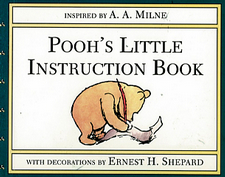
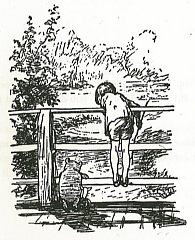
sometimes, if you stand
on the bottom rail of a
bridge and lean over to
watch the river slipping
slowly away beneath you,
you will suddenly
know everything there is
to be known...
A.A. Milne(18
January 1882 – 31 January 1956) was an English author, best
known for his books about the teddy bear
Winnie-the-Pooh and for various children's poems. Milne
was a noted writer, primarily as a playwright, before the
huge success of Pooh overshadowed all his previous work.
Dec
2011 Constantine P. Cavafy "Ithica"
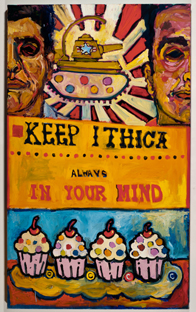
When you set out for Ithaka
ask that your way be long,
full of adventure, full of instruction.
The Laistrygonians and the Cyclops,
angry Poseidon - do not fear them:
such as these you will never find
as long as your thought is lofty, as long as a rare
emotion touch your spirit and your body.
The Laistrygonians and the Cyclops,
angry Poseidon - you will not meet them
unless you carry them in your soul,
unless your soul raise them up before you.
Ask that your way be long.
At many a Summer dawn to enter
with what gratitude, what joy -
ports seen for the first time;
to stop at Phoenician trading centres,
and to buy good merchandise,
mother
of pearl and coral,
amber
and ebony,
and sensuous perfumes of every kind,
sensuous perfumes as lavishly as you can;
to visit many Egyptian cities,
to gather stores of knowledge from the learned.
Have Ithaka always in your mind.
Your arrival there is what you are destined for.
But don't in the least hurry the journey.
Better it last for years,
so that when you reach the island you are old,
rich with all you have gained on the way,
not expecting Ithaka to give you wealth.
Ithaka gave you a splendid journey.
Without her you would not have set out.
She hasn't anything else to give you.
And if you find her poor, Ithaka hasn't deceived you.
So wise you have become, of such experience,
that already you'll have understood what these Ithakas mean.
August 2011 Sherman Alexie "never slow dance with your
skeletons"
Submitted by Karla Alaniz

"Before he left for good,
though, he turned back to Junior
and me and yelled at us. I couldn’t really understand
what he was
saying, but Junior swore he told us not to slow dance with
our
skeletons.
“What the hell does that mean?” I
asked.
“I don’t know,” Junior said.
There are things you should learn.
Your past is a skeleton
walking one step behind you, and your future is a skeleton
walking
one step in front of you. Maybe you don’t wear a
watch, but your
skeletons do, and they always know what time it is.
Now, these
skeletons are made of memories, dreams, and voices.
And they can
trap you in the in-between, between touching and becoming.
But
they’re not necessarily evil, unless you let them be.
What you have to do is keep moving,
keep walking, in step
with your skeletons. They ain’t ever going to leave
you, so you
don’t have to worry about that. Your past ain’t going
to fall
behind, and your future won’t get too far ahead.
Sometimes, though,
your skeletons will talk to you, tell you to sit down and
take a
rest, breathe a little. Maybe they’ll make you
promises, tell you
all the things you want to hear.
Sometimes your skeletons will dress
up as beautiful Indian
women and ask you to slow dance. Sometimes your
skeletons will
dress up as your best friend and offer you a drink, one more
for the
road. Sometimes your skeletons will look exactly like
your parents
and offer you gifts.
But, no matter what they do, keep
walking, keep moving.
And don’t wear a watch. Hell, Indians never need to
wear a watch
because your skeletons will always remind you about the
time. See,
it is always now. That’s what Indian time is.
The past, the
future, all of it is wrapped up in the now. That’s how
it is. We
are all trapped in the now."
The Lone Ranger and Tonto Fistfight in
Heaven is a 1993 collection
of interconnected short stories by Sherman Alexie
Official Website of Sherman Alexie
May 2011 Jack
LaLanne "LaLanneisms"

Jack LaLanne fervently believes
every human being can attain maximum body health and
fitness if they will practice moderation, eat the
most natural foods, and exercise on a regular basis.
Over the years on national television, radio talk
shows and in feature stories written about Jack,
certain ideas stated by Jack have become little gems
known as “LaLanneisms”
Here are a few of Jack’s words of
wisdom:
- Anything in life is
possible if you make it happen.
- Anything in life is
possible and you can make it happen.
- Your waistline is your
lifeline.
- Exercise is King,
nutrition is Queen, put them together and you’ve
got a kingdom.
- Don’t exceed the feed
limit.
- The food you eat today is
walking and talking tomorrow.
- Ten seconds on the lips
and a lifetime on the hips.
- Better to wear out than
rust out
- Do – don’t stew.
- People don’t die of old
age, they die of inactivity.
- First we inspire them,
then we perspire them.
- You eat everyday, you
sleep everyday, and your body was made to
exercise everyday.
- Work at living and you
don’t have to die tomorrow.
- I can’t die, it would ruin
my image.
- If man makes it, don’t eat
it.
- If it tastes good, spit it
out.
- What’s it doing for me?
- Your health account is
like your bank account: The more you put in, the
more you can take out.
- If one apple is good, you
wouldn’t eat 100.
- It’s not what you do some
of the time that counts, it’s what you do all of
the time that counts.
- Make haste slowly.
- Eat right and you can’t go
wrong.
From
www.jacklalanne.com
Dec 2010 Hans
Christian Anderson "The Emperor's New Clothes"
....So off went the
Emperor in procession under his splendid
canopy. Everyone in the streets and the
windows said, "Oh, how fine are the
Emperor's new clothes! Don't they fit him to
perfection? And see his long train!" Nobody
would confess that he couldn't see anything,
for that would prove him either unfit for
his position, or a fool. No costume the
Emperor had worn before was ever such a
complete success.
"But he hasn't got
anything on," a little child said.
"Did you ever hear such
innocent prattle?" said its father. And one
person whispered to another what the child
had said, "He hasn't anything on. A child
says he hasn't anything on."
"But he hasn't got
anything on!" the whole town cried out at
last.
The Emperor shivered,
for he suspected they were right. But he
thought, "This procession has got to go on."
So he walked more proudly than ever, as his
noblemen held high the train that wasn't
there at all.

At Wikipedia, the free encyclopedia
May-Jun 2010 "The
Three Hairs"
Attitude
There once was a woman who woke up one morning,
looked in the mirror,
and noticed she had only three hairs on her head.
Well, she said,
I think I'll braid my hair today!
So she did.
And she had A
Wonderful Day!
The next day she woke up ,
looked in the mirror
and saw that she had only two hairs on her head
Hmmm, she said,
I think I'll part my hair down the middle today!
so she did.
And she had a
Grand Day!
The next day she woke up,
looked in the mirror and noticed that she had only one hair
on her head.
Well, she said,
today I'm going to wear my hair in a pony tail.
So she did.
And she had a
Fun Day!
The next day she woke up,
looked in the mirror and noticed that there wasn't a single
hair on her head.
Yea, she exclaimed,
I don't have to fix my hair today!
Attitude is everything.
Anonymous
Jan-Feb 2010 Dean Alfange "My Creed"
I
do not choose to be a common man. It is my right to be
uncommon - if I can. I seek opportunity - not security. I do
not wish to be a kept citizen, humbled and dulled by having
the state look after me. I want to take the calculated risk;
to dream and to build, to fail and to succeed.
I
refuse to barter incentive for dole. I prefer the challenges
of life to the guaranteed existence: the thrill of
fulfillment to the stale calm of Utopia. I will not trade
freedom for beneficence nor my dignity for a handout. I will
never cower before any master nor bend to any threat. It is
my heritage to stand erect; proud and unafraid to think and
act for myself; to worship as I please, to enjoy the
benefits of my creations, and to face the world and boldly
say, "This I have done." All this is what it means to be an
"AMERICAN".
The Honorable Dean Alfange was an American
statesman born December 2, 1899, in Constantinople. He
served in the U.S. Army during World War I and attended
Hamilton College, graduating in the class of ’22. Hamilton
offers the “Dean Alfange Essay Prizes” established by Dean
Alfange and awarded to the students who write the best and
second-best essays on a feature or an issue of American
constitutional government.

This creed is the message of the
Jack and Greta Stalsby Foundation, a charitable foundation
based in San Antonio Texas which has as it's goal to give
back and help others to become “equal” and “have a chance”
in life through education.
Nov-Dec 2009
W. H. Murray "Commitment"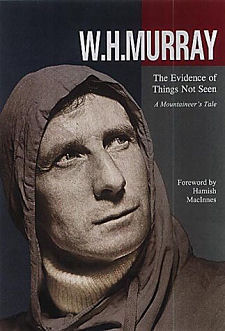
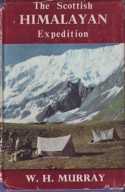 "Until
one is committed there is hesitancy,
"Until
one is committed there is hesitancy,
the chance to draw
back,
always
ineffectiveness....
The moment one
definitely commits oneself,
then Providence moves
too.
All sorts of things
occur to help one
that would otherwise
never have occurred.
A whole stream of
events issues from the decision,
raising in one's
favor all manner of unforeseen incidents
and meetings and
material assistance,
which no man could
have dreamt would have come his way."
W. H. Murray 1951 The Scottish
Himalayan Expedition
July-August 2009 Albert Maltz "Indian Wedding Prayer"
Spoken at the Wedding of Ben Christian and
Monika Zikri, 25 July 09, Los Angeles, California.


Now you will feel no
rain,
for each of you will be shelter for the
other.
Now you will feel no cold,
for each of you will be warmth to the
other.
Now there is no more loneliness,
for each of you will be companion to the
other.
Now you are two persons,
But there is only one life before you.
Go now to your dwelling
to enter into the days of your
Life together.
And may your days
be good and long
upon the earth.
Albert Maltz
Apache Wedding Prayer at Wikipedia
May-June 2009
Dorothea Brande "The Will to Fail "
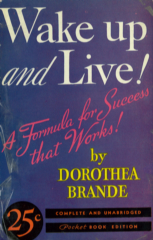 “TWO
YEARS ago I came across a formula for success which has
revolutionized my life. It was so simple, and so obvious
once I had seen it, that I could hardly believe it was
responsible for the magical results which followed my
putting it into practice.
“TWO
YEARS ago I came across a formula for success which has
revolutionized my life. It was so simple, and so obvious
once I had seen it, that I could hardly believe it was
responsible for the magical results which followed my
putting it into practice.
The first thing to confess is that two years ago I was a
failure. Oh, nobody knew it except me and those who knew me
well enough to see that I was not doing a tenth of what
could be expected of me. I held an interesting position,
lived not too dull a life—yet there was no doubt in my own
mind, at least, that I had failed. What I was doing was a
substitute activity for what I had planned to do; and no
matter how ingenious and neat the theories were which I
presented to myself to account for my lack of success, I
knew very well that there was more work that I should be
doing, and better work, and work more demonstrably my own.
So we slip through the
world without making our contribution, without discovering
all that there was in us to do, without using the most
minute fraction of our abilities, either native or
acquired. If we manage to be fairly comfortable, to get
some respect and admiration, the taste of ‘a little brief
authority” and some love, we think you have made a good
bargain, we acquiesce in the Will to Fail.
We even pride ourselves on our shrewdness, not suspecting
how badly we' have been cheated, that we have settled for
the compensations of death not the rewards of life.”
Dorothea Brande, "Wake up and Live" 1936
Order .pdf eBook
Wake
Up and Live the 1937 Musical at Wikipedia
Mar-Apr 2009
James Redfield "The Tenth Insight "Together we are
going somewhere"
"Together
we are going somewhere, each generation building upon the
accomplishments of the previous one, destined for an end we
can only dimly remember. We're all in the process of
awakening and opening up to who we really are, and what we
came here to do, which is often a very difficult task. Yet
I firmly believe that if we always integrate the best of the
traditions we find before us and keep the process in mind,
each challenge along the way, each interpersonal irritation
can be overcome with a sense of destiny and miracle.
I don't mean to minimize the formidable problems still
facing humanity, only to suggest that each of us in our own
way is involved in the solution. If we stay aware and
acknowledge the great mystery that is this life, we will see
that we have been perfectly placed, in exactly the right
position . . . to make all the difference in the world."
James
Redfield, "The Tenth Insight"
Jan-Feb 2009
William Henley "Invictus"
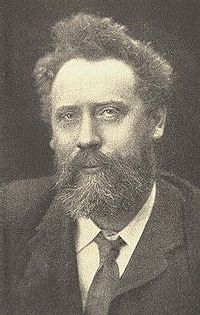 Out
of the night that covers me,
Out
of the night that covers me,
Black as the Pit from pole to
pole,
I thank whatever gods may be
For my unconquerable soul.
In the fell clutch of circumstance
I have not winced nor cried aloud.
Under the bludgeonings of chance
My head is bloody, but unbowed.
Beyond this place of wrath and tears
Looms but the horror of the shade,
And yet the menace of the years
Finds, and shall find me,
unafraid.
It matters not how strait the gate,
How charged with punishments the
scroll,
I am the master of my fate;
I am the captain of my soul.
Arguably his best-remembered work is
the poem "Invictus",
written in 1875. It is
said that this was
written as a
demonstration of his
resilience following the
amputation of his foot
due to tubercular
infection.
William Ernest Henley at Wikipedia
Nov
-Dec 2008 Jack London "Jack London's Credo"

I would rather be ashes than dust!
I would rather that my spark should burn out
in a brilliant blaze than it should be stifled by
dry-rot.
I would rather be a superb meteor, every atom
of me in magnificent glow, than a sleepy and
permanent planet.
The function of man is to live, not to exist.
I shall not waste my days trying to prolong them.
I shall use my time.
The source above comes from a book edited
by Irving Shepard, Jack London's Tales of Adventure
(New York: Doubleday, 1956), p. vii.
Jack
London Online Collection
Jack
London at Wikepedia
Aug-Sep 2008 David Foster & Carol Sager "The Prayer"
I pray you'll
be our eyes, and watch us where we go
And help us to be wise in times when we don't know
Let this be our prayer, when we lose our way
Lead us to the place, guide us with your grace
To a place where we'll be safe
I pray we'll find your light, and hold it in our hearts
When stars go out each night,
remind us where you are
Let this be our prayer, when shadows fill our day
Help us find a place, guide us with your grace
Give us faith so we'll be safe
A world where pain and sorrow will be ended
And every heart that's broken will be mended
And we'll remember we are all God's children
Reaching out to touch you
Reaching to the sky
We ask that life be kind, and watch us from above
We hope each soul will find another soul to love
Let this be our prayer, just like every child
Who needs to find a place, guide us with your grace
Give us faith so we'll be safe
Needs to find a place, guide us with your grace
Give us faith so we'll be safe
Version Recorded by Angie
(Granddaughter)
and Rose (Daughter in Law) Christian and played at the Memorial Service,
12 Aug 08, for
Sara Sipes, Dr. Christian's Mother who passed on 8 Jul 08.
 I
pray you'll be our eyes, and watch us where we go
I
pray you'll be our eyes, and watch us where we go
And help us to be wise in times when we don't know
Let this be our prayer, when we lose our way
Lead us to the place, guide us with your grace
To a place where we'll be safe
I pray we'll find your light, and hold it in our hearts
When stars come out each night,
The dark will be aglow.
Let this be our prayer, when shadows fill our day
Lead us to a place, guide us with your grace
Give us faith so we'll be safe.
To know a world no longer filled with sorrow
A world where children dream
of tomorrow
A world of hope
and love for one another
Reaching for our brother for eternity.
We ask that life be kind, and watch us from above
We hope each soul will find another soul to love
Let this be our prayer, just like every child
Lead us to a place, guide us
with your grace
Give us faith so we'll be safe
Lead us to a place, guide us with your grace
To a place where we'll be safe.
Sara
Blanche Rogers Christian Sipes Tribute Page
From Wikipedia, the free
encyclopedia
Jun-Jul 2008 John Mitchum and John Wayne "America, Why I
Love Her"
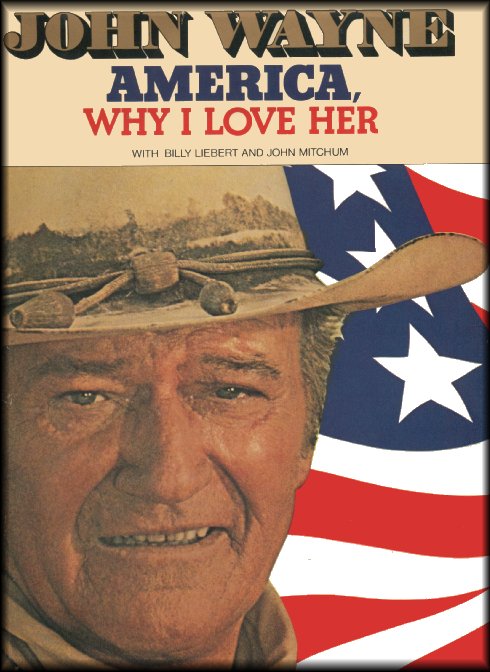
"America, America, God shed his grace on thee..."
You ask me Why I Lover Her? Well, give me time and
I'll explain.
Have you see a Kansas sunset or an Arizona rain?
Have you drifted on a bayou down Louisiana way?
Have you watched a cold fog drifting over San Francisco Bay?
Have you heard a bobwhite calling in the Carolina
pines,
Or heard the bellow of a diesel at the Appalachia mines?
Does the call of Niagara thrill you when you hear her waters
roar?
Do you look with awe and wonder at her Massachusetts shore,
Where men who braved a hard new world first stepped on
Plymounth's rock?
And do you think of them when you stroll along a new York
City dock?
Have you seen a snowflake drifting in the Rockies, way
up high?
Have you seen the sun come blazing down from a bright Nevada
sky?
Do you hail to the Columbia as she rushes to the sea,
Or bow your head at Gettysburg at our struggle to be free?
Have you seen the mighty Tetons? Have you watched an
eagle soar?
Have you see the Mississippi roll along Missouri's shore?
Have you felt a chill at Michigan when on a winter's day
Her waters rage along the shore in thunderous display?
Does the word "Aloha" make you warm? Do you stare in
disbelief
When you see the surf come roaring in at Waimea Reef?
From Alaska's cold to the Everglades, from the Rio
Grande to Maine,
My heart cries out, my pulse runs fast at the might of her
domain.
You ask me Why I Love Her? I've a million reasons why:
My Beautiful America, beneath God's wide, wide sky.
"And crown thy good with brotherhood from sea to
shining sea."
 America,
Why I Love Her, by John Wayne, with Billy Liebert and
the poetry of John Mitchum, was published in 1977 by Simon
and Schuster.
America,
Why I Love Her, by John Wayne, with Billy Liebert and
the poetry of John Mitchum, was published in 1977 by Simon
and Schuster.
Check out a nice Flash Version of this Classic
narrated by John Wayne at
Sagebrush Patriot
Apr 2008 Richard Bach "Jonathan Livingston Seagull"
Excerpt from Part 2 .."a
one-in-a-million-bird" and "the gull sees farthest who flies
highest."
,
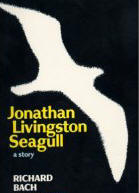 "The
only answer I can see, Jonathan, is that you are pretty well
a
"The
only answer I can see, Jonathan, is that you are pretty well
a
one-in-a-million bird. Most of us came along ever so slowly.
We went from
one world into another that was almost exactly like it,
forgetting right
away where we had come from, not caring where we were
headed, living for
the moment. Do you have any idea how many lives we must have
gone through
before we even got the first idea that there is more to life
than eating,
or fighting, or power in the Flock? A thousand lives, Jon,
ten thousand!
And then another hundred lives until we began to learn that
there is such
a thing as perfection, and another hundred again to get the
idea that our
purpose for living is to find that perfection and show it
forth. The same
rule holds for us now, of course: we choose our next world
through what we
learn in this one. Learn nothing, and the next world is the
same as this
one, all the same limitations and lead weights to overcome."
"You know the proverb,
and it's
true: The gull sees farthest who flies highest. Those gulls
where you came
from are standing on the ground, squawking and fighting
among themselves.
They're a thousand miles from heaven - and you say you want
to show them
heaven from where they stand! Jon, they can't see their own
wingtips! Stay
here. Help the new gulls here, the ones who are high enough
to see what
you have to tell them."
The last point was
the telling one, and Sullivan was right "The gull
sees farthest who flies highest."
Part Two Jonathan
Livingston Seagull, Richard Bach 1973
Full Text of Book . pdf File
Jonathan Livingston Seagull at Wikipedia
Feb 2008 Antonio Carlos Jobim "Corcovado"
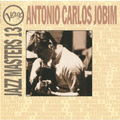
A gentle force of nature, Antonio Carlos Jobim loved the way
that Joao Gilberto tamed the Samba into Bossa Nova. By
merging this with American jazz, European classical
influences and his unique melodic gifts, Jobim became one of
the few songwriters to rank alongside the likes of George
Gershwin and Cole Porter. Even once you get past "The Girl
of Ipanema" and discover such bittersweet gems as "Wave,"
"How Insensitive" and "Corcovado," only part of his canon is
truly Bossa Nova.
Quiet nights of quiet stars,
Quiet chords from my guitar
Floating in the silence that surrounds us
Quiet thoughts and quiet dreams,
Quiet walks by quiet
streams,
and a window
looking on the mountains and the sea.
How lovely! this is where i want to be.
Here, with you so close to me,
Until the final flicker of
life's ember.
I who was lost and lonely, believing life was only
A bitter tragic joke, have found with you
The meaning of existence oh, my love.
Um cantinho, um violão
Esse amor, uma canção
Pra fazer feliz a quem se ama
Muita calma pra pensar
E ter tempo pra sonhar
Da janela vê-se o Corcovado
O Redentor, que lindo!
Quero a vida sempre assim
Com você perto de mim
Até o apagar da velha chama
E eu que era triste
Descrente desse mundo
Ao encontrar você eu conheci
O que é felicidade, meu amor.
"Corcovado"
By Charlie Byrd
Most Beautiful Version of this Song! EVER!!!
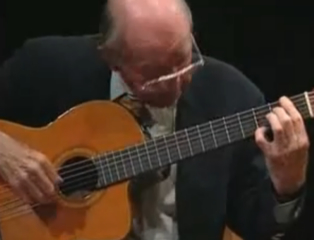


Friday,
Dec. 31, 1999
Best Song "Strange Fruit" by
Billie Holiday (1939)
In this sad, shadowy song about lynching in the South,
history's greatest jazz singer comes to terms with history
itself.
1st RUNNER-UP Corcovado by
Antonio C. Jobim;
2nd "A Hard Rain's a-Gonna Fall"
by Bob Dylan
Dec 2007 Lewis Carroll "...the happy summer days."
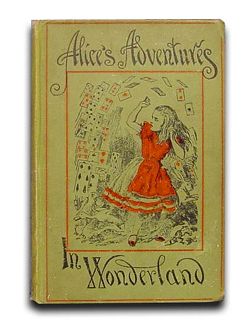 Alice's
Adventure in Wonderland
Alice's
Adventure in Wonderland
Chapter XII
Alice's Evidence, Last
paragraph..
"Lastly, she pictured to herself how this
same little sister of hers would, in the after-time, be
herself a grown woman; and how she would keep, through all
her riper years, the simple and loving heart of her
childhood: and how she would gather about her other little
children, and make their eyes bright and eager with
many a strange tale, perhaps even with the dream of
Wonderland of long ago: and how she would feel with all
their simple sorrows, and find a pleasure in all their
simple joys, remembering her own child-life, and the happy
summer days."
Lewis Carroll "Alice's Adventures in
Wonderland"

Lewis Carroll
was the pen-name of Charles Lutwidge
Dodgson.
Biography Here
Alice's Adventures in Wonderland at Wikipedia
Oct - Nov 2007 Benjamin Franklin "The 13 Virtues.."

Practical
advice on obtaining a perfectly moral bearing.
From his
autobiography.
Franklin sought to
cultivate his character by a plan of thirteen virtues, which
he developed at age 20 (in 1726) and continued to practice
in some form for the rest of his life.
"In the various
enumerations of the moral virtues I had met with in
my reading, I found the catalogue more or less
numerous, as different writers included more or
fewer ideas under the same name. Temperance, for
example, was by some confined to eating and
drinking, while by others it was extended to mean
the moderating every other pleasure, appetite,
inclination, or passion, bodily or mental, even to
our avarice and ambition. I propos'd to myself, for
the sake of clearness, to use rather more names,
with fewer ideas annex'd to each, than a few names
with more ideas; and I included under thirteen names
of virtues all that at that time occurr'd to me as
necessary or desirable, and annexed to each a short
precept, which fully express'd the extent I gave to
its meaning.
These names of
virtues, with their precepts, were:
-
TEMPERANCE. Eat not to dullness; drink not
to elevation.
-
SILENCE. Speak not but what may benefit
others or yourself; avoid trifling conversation.
-
ORDER. Let all your things have their
places; let each part of your business have its
time.
-
RESOLUTION. Resolve to perform what you
ought; perform without fail what you resolve.
-
FRUGALITY. Make no expense but to do good to
others or yourself; i.e., waste nothing.
-
INDUSTRY. Lose no time; be always employ'd
in something useful; cut off all unnecessary
actions.
-
SINCERITY. Use no hurtful deceit; think
innocently and justly, and, if you speak, speak
accordingly.
-
JUSTICE. Wrong none by doing injuries, or
omitting the benefits that are your duty.
-
MODERATION. Avoid extreams; forbear
resenting injuries so much as you think they
deserve.
-
CLEANLINESS. Tolerate no uncleanliness in
body, cloaths, or habitation.
-
TRANQUILITY. Be not disturbed at trifles, or
at accidents common or unavoidable.
-
CHASTITY. Rarely use venery but for health
or offspring, never to dullness, weakness, or
the injury of your own or another's peace or
reputation.
-
HUMILITY. Imitate Jesus and Socrates.
My intention
being to acquire the habitude of all these virtues,
I judg'd it would be well not to distract my
attention by attempting the whole at once, but to
fix it on one of them at a time; and, when I should
be master of that, then to proceed to another, and
so on, till I should have gone thro' the thirteen;
and, as the previous acquisition of some might
facilitate the acquisition of certain others, I
arrang'd them with that view, as they stand above."
Excerpt from
The Autobiography of Benjamin Franklin

The 7
Deadly Sins and Gilligan's Island
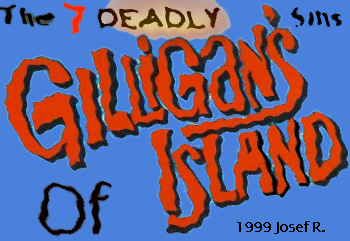
Aug - Sep 2007 D'Invilliers "Then wear the gold hat"
"Then wear the gold hat,
if that will move her;
If you can bounce high,
bounce for her too,
Till she cry
“Lover, gold-hatted,
high-bouncing lover, I must have you!”
Thomas Parke D'Invilliers
 Thomas
Parke D'Invilliers
is both a pen name of Francis Scott
Fitzgerald and a character in his
quasi-autobiographical first novel, This
Side Of Paradise. In the novel,
D'Invilliers represents the poet John Peale
Bishop, a friend of Fitzgerald's at
Princeton and a member of the class of 1917.
Thomas
Parke D'Invilliers
is both a pen name of Francis Scott
Fitzgerald and a character in his
quasi-autobiographical first novel, This
Side Of Paradise. In the novel,
D'Invilliers represents the poet John Peale
Bishop, a friend of Fitzgerald's at
Princeton and a member of the class of 1917.
The
introduction for Fitzgerald's The Great
Gatsby features a poem ostensibly by
D'Invilliers called Then Wear the Gold
Hat.
The
Great Gatsby at Wikepedia
Mar Apr 2007 Dr. Christian "As i drove i found Spring"
As I drove, each grove gradually gave its evidence of
Spring and new life.
First a glimpse of green haze here and there.
Slowly those imperceptibly fused into a thin
Green veil cast over each naked limb.
Now and then a flowering dogwood broke the scene.
Finally the green gushed forth unleashed
And a new spring was born.
I found Spring as I drove.
As I drove, the ground too gradually greeted me
With its proclamation of Spring
Brown mounds broke thru slowly melting white
Showing patches of yellow grass yearning to grow.
Green faintly surfaced, drawn forth by a
Pleading sun and then melted to form a
Lush blanket which was soon spotted with the
other colors of Spring, Red Clover, Yellow Daisies,
Bluebonnets.
I found Spring as I drove,
and I wanted to share it with you…
Charles Christian 1979
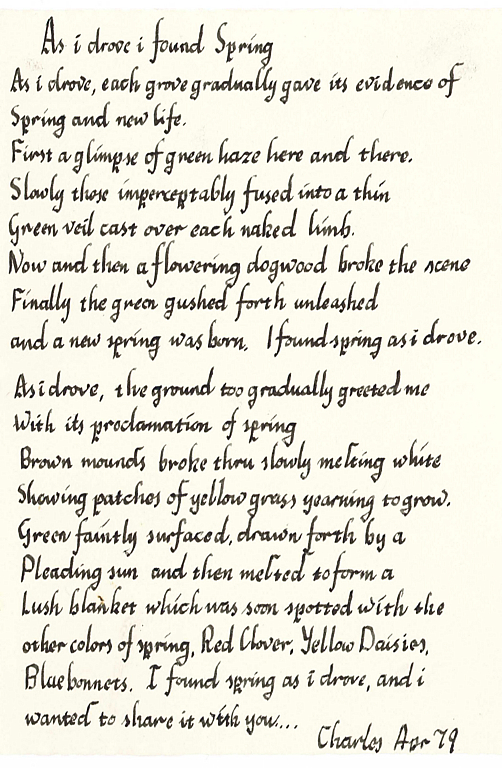 This was written in
1979. I had begun my CardioThoracic Surgery residency at
Wilford Hall and the Air Force sent me to St. Lukes Hospital
of Milwaukee for some training for 3 months, Jan-Mar 79.
This turned out to be the coldest, snowiest winter Milwaukee
had ever had. It was the first time all schools closed. The
seniors in high school were sent around the city on foot to
check each and every house to make sure people were OK. We
had to live at the hospital because you could not get around
the streets!
This was written in
1979. I had begun my CardioThoracic Surgery residency at
Wilford Hall and the Air Force sent me to St. Lukes Hospital
of Milwaukee for some training for 3 months, Jan-Mar 79.
This turned out to be the coldest, snowiest winter Milwaukee
had ever had. It was the first time all schools closed. The
seniors in high school were sent around the city on foot to
check each and every house to make sure people were OK. We
had to live at the hospital because you could not get around
the streets!
On 1 April 79
my rotation was over and I started driving back to San
Antonio and Wilford Hall. When I left Milwaukee there was
still much snow, three days later in Texas it was spring.
Original Calligraphy Handwritten Document
Jan Feb 2007 England Dan and John Ford Coley "I'd
really love to see you tonight" 1976
 Hello,
yeah it's been awhile
Hello,
yeah it's been awhile
Not much how 'bout you?
I'm not sure why I called
Guess I really just wanted to talk to you
*
And I was thinking maybe later on
We could get together for awhile
It's been such a long time
And I really do miss your smile
*
Chorus
I'm not talking 'bout movin' in
And I don't want to change your life
But there's a warm wind blowing the stars
around
And I'd really love to see you tonight
*
We could walking through a windy park
Or take a drive along the beach
Or stay a home and watch TV
You see it really doesn't matter
much to me
*
I won't ask for promises
So you won't have to lie
We've both played this game before
Say I love you
Say goodbye
*
Chorus
I'm not talking 'bout movin' in
And I don't want to change your life
But there's a warm wind blowing the stars
around
And I'd really love to see you tonight
 "I'd
Really Love To See You Tonight"
on You Tube
"I'd
Really Love To See You Tonight"
on You Tube
Mp3 File Download
Link to
Karaoke Music for this song
Guitar Tabs
Nov-Dec 2006 Robert Frost "The Road Not Taken"
Two roads diverged in a yellow wood,
And sorry I could not travel both
And be one traveller, long I stood
And looked down one as far as I could.
To where it bent in the undergrowth,
Then took the other, as just as fair,
And having perhaps the better claim,
Because it was grassy and wanted wear,
Though as for that, the passing there
Had worn them really about the same,
And both that morning equally lay
In leaves no step had trodden black.
Oh, I kept the first for another day!
Yet knowing how way leads on to way
I doubted if I should ever come back.
I shall be telling this with a sigh
Somewhere ages and ages hence:
Two roads diverged in a wood, and I --
I took the one less travelled by,
And that has made all the difference.


A unique
literary experience
in a beautiful setting
— Robert Frost’s homestead in
Franconia, New Hampshire
At Wikipedia, the free encyclopedia
Sep-Oct 2006
Barbara Streisand "Putting It Together"
 “The
art of making art is putting it together bit by bit, beat by
beat”
“The
art of making art is putting it together bit by bit, beat by
beat”
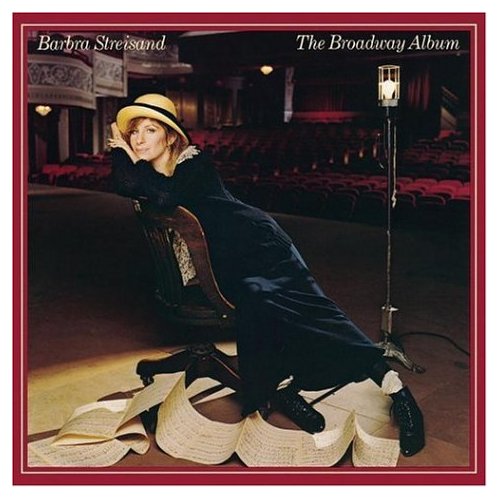
—Barbara Streisand, “Putting It Together”
PUTTING IT TOGETHER
Barbra Streisand
(from The Broadway Album)
Barbra:Look, I've spent a lot of time working on this --
Voice 1:Look, no one's gonna buy it -- no one.
Voice 2:No one in Middle America, anyway. That's for sure.
Voice 3:He's right!
Voice 1:Sweetheart, it's just not commercial!
Barbra:What is commercial?
Voice 2:It's not what's selling nowadays.
Voice 1:I mean - personally, I love it, but --
B (sung):Be nice, girl!
Voice 3:Nobody's into this kind of material.
B (sung):You have to pay a price, girl!
Voice 2:This album needs a hit single we can push.
B (sung):They like to give advice, girl!
Voice 1:The whole idea's too risky.
B (sung):Don't think about it twice, girl!
Voice 2:The audience won't understand this kind of thing!
B (sung):It's time to get to work!
Barbra:I disagree! Why don't you wait until you hear it?
Voice 3:This is like your old stuff!
B (sung):Art isn't easy.
Voice 3:You've got to appeal to the kids.
B (sung):Even when you're hot.
Voice 2:Why would you want to make an album like this
anyway?
B (sung):Advancing art is easy.
Voice 1:I think we ought to talk seriously about this.
B (sung):Financing it is not!
Voice 2:Why take chances?
B (sung):A vision's just a vision if it's only in your head!
Voice 1:Nobody respects your artistic integrity more than I
do, but -
B (sung):If no one gets to hear it, it's as good as dead!
Voice 2:You have to think about you career!
B (sung):It has to come to life!
B (sung):
Bit by bit / Putting it together
Piece by piece / Only way to make a work of art
Every moment makes a contribution
Every little detail plays a parts
Having just a vision's no solution
Everything depends on execution
Putting it together / That's what counts!
Ounce by ounce / Putting in together
Small amounts / Having it can make a work of art
First of all you need a good foundation
Otherwise it's risky from the start
Takes a little cocktail conversation
But without the proper preparation
Having just a vision's no solution
Everything depends on execution
The art of making art
Is putting it together / Bit by bit
Voice 2:Do we really need all these musicians?
Link by link / Making the connections Yes we do!
Drink by drink / Taking every comment as it comes
Learning how to play the politician
Like you play piano, bass and drums
Otherwise you'll find your composition
Isn't gonna get much exhibition
Art isn't easy
Every minor detail / Is a major decision
Have to keep things in scale
Have to hold to your vision
Voice 1:Why don't we talk about this over dinner, darling?
What's a little cocktail conversation
If it gets the funds for your foundation
Every time I start to feel defensive --
I remember vinyl is expensive!
Voice 3:Would you agree to do an interview?
Barbra:Maybe one!
Dot by dot / Building up the image
Shot by shot / Keeping at a distance doesn't pay
Soon as you remember your objective
Keeps all your privacy away
A little bit of hype can be effective
As long as you can keep it in perspective
Even when you get some recognition
Everything you do you still audition
Art isn't easy
Overnight you're a trend / You're the right combination
Then the trend's at an end
You're suddenly last year's sensation!
All they ever want is repetition
All they really like is what they know
You gotta keep a link with your tradition
Got to learn to trust your intuition
While you reestablish your position
So that you can be on exhibi-
Spoken:So that your work can be on exhibition!!!
B (sung):
Be new, girl!
They tell you till they're blue, girl!
You're new, or else you're through, girl!
And even if it's true, girl,
You do what you can do!
Bit by bit / Putting it together
Piece by piece / Working on the vision night and day
All it takes is time and perseverance
And a little luck along the way
Putting in a personal appearance
Gathering supporters and adherents
Voice 1:Well, she's an original!
Voice 3:WAS!
Noting every song but in addition
Harmonizing each negotiation
Balancing the part that's all musicians
With the part that's strictly presentation
Balancing the money with the mission
Till you have the perfect orchestration
Even if you do have the suspicion
That it's taking all your concentration
The art of making art
Is putting it together / Bit by bit
Beat by beat / Part by part
Sheet by sheet / Chart by chart
Track by track by bit by reel by stack by stock by stick by
steel
by shpiel and the-e-e-en, It's the state of the art!

Barbara Streisand at Wikipedia
Jul-Aug 2006
Theodore Roosevelt "The Man in the Arena" 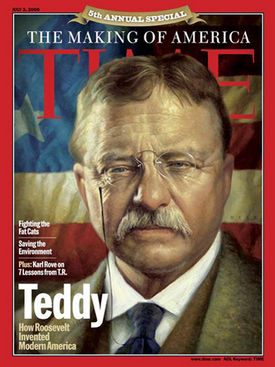
It is not the critic who counts, not the man
who points out how the strong man stumbled, or where the
doer of deeds could have done better. The credit belongs to
the man who is actually in the arena; whose face is marred
by the dust and sweat and blood; who strives valiantly; who
errs and comes short again and again; who knows the great
enthusiasms, the great devotions and spends himself in a
worthy cause; who at the best, knows in the end the triumph
of high achievement, and who, at worst, if he fails, at
least fails while daring greatly; so that his place shall
never be with those cold and timid souls who know neither
victory or defeat.
|
by Theodore Roosevelt
(From a speech delivered in
Paris in 1910) |

Theodore
Roosevelt.com
June 2006 Max
Ehrmann "Desiderata"

- Go
placidly amid the noise and the haste,
and remember what peace there may be in
silence. As far as possible without
surrender be on good terms with all
persons. Speak your truth quietly and
clearly; and listen to others, even the
dull and the ignorant; they too have
their story. Avoid loud and aggressive
persons, they are vexations to the
spirit.
- If
you compare yourself with others, you
may become vain and bitter; for always
there will be greater and lesser persons
than yourself. Enjoy your achievements
as well as your plans. Keep interested
in your own career, however humble; it
is a real possession in the changing
fortunes of time.
-
Exercise caution in your business
affairs, for the world is full of
trickery. But let not this blind you to
what virtue there is; many persons
strive for high ideals, and everywhere
life is full of heroism.
-
- Be
yourself. Especially, do not feign
affection. Neither be cynical about
love; for in the face of all aridity and
disenchantment it is as perennial as the
grass. Take kindly the counsel of the
years, gracefully surrendering the
things of youth.
-
Nurture strength of spirit to shield you
in sudden misfortune. But do not
distress yourself with dark imaginings.
Many fears are born of fatigue and
loneliness. Beyond a wholesome
discipline, be gentle with yourself. You
are a child of the universe, no less
than the trees and the stars; you have a
right to be here. And whether or not it
is clear to you, no doubt the universe
is unfolding as it should.
-
Therefore, be at peace with God,
whatever you conceive Him to be. And
whatever your labors and aspirations, in
the noisy confusion of life keep peace
in your soul. With all its sham,
drudgery and broken dreams, it is still
a beautiful world.
- Be
cheerful.
-
Strive to be happy.
Max
Ehrmann 1927

From Wikipedia, the free
encyclopedia
May 2006
Alan Cohen " The Main Thing..."
The rascal sage Nasrudin
stood on the bow of a ferryboat next to a pompous professor.
"Have you ever studied astronomy?" asked the professor.
"I can’t say that I
have," answered the mystic.
"Then you have wasted
much of your life," the scholar declared. "Knowing the
constellations, a skilled captain can navigate a boat around
the entire globe."
A while later the
intellectual asked Nasrudin, "Have you studied meteorology?"
"No," answered Nasrudin.
"Then you have wasted
most of your life," chided the academician. "Methodically
capturing the wind can propel a sailing ship at astounding
speeds."
Another while passed,
and the professor continued to quiz Nasrudin, "Have you ever
studied oceanography?"
"Not at all."
"My, how you have wasted
your time! Awareness of the currents helps sailors find food
and shelter."
A few minutes later
Nasrudin approached the professor and nonchalantly asked
him, "Have you ever studied swimming, doctor?"
"Haven’t had the time,"
the professor answered haughtily.
"Then you’ve wasted all
of your life. The boat is sinking."
Before setting out on a
project, relationship, career, or life, you must set your
priorities. You must decide what is important and what is a
detail. Then, simple as it sounds, the success of your
endeavor depends on remembering what is important and what
is a detail. One of my favorite affirmations is: The main
thing is to keep the main thing the main thing. What is
your main thing? Are you living true to it?

Alan Cohen
Alan Cohen is the author of many popular inspirational
books, including the best-selling The Dragon Doesn’t
Live Here Anymore and Mr. Everit’s Secret: What I
Learned from the World’s Richest Man.
April 2006 Henry David
Thoreau "If one advances confidently in the direction
of his dreams..."
 I
left the woods for as good a reason as I
went there. Perhaps it seemed to me that I
had several more lives to live, and could
not spare any more time for that one. It is
remarkable how easily and insensibly we fall
into a particular route, and make a beaten
track for ourselves. I had not lived there a
week before my feet wore a path from my door
to the pond-side and though it is five or
six years since I trod it, it is still quite
distinct. It is true I fear, that others may
have fallen into it, and so helped to keep
it open. The surface of the earth is soft
and impressible by the feet of men; and so
the paths with which the mind travels. How
worn and dusty, then, must be the highways
of the world, how deep the ruts of tradition
and conformity! [...] I
left the woods for as good a reason as I
went there. Perhaps it seemed to me that I
had several more lives to live, and could
not spare any more time for that one. It is
remarkable how easily and insensibly we fall
into a particular route, and make a beaten
track for ourselves. I had not lived there a
week before my feet wore a path from my door
to the pond-side and though it is five or
six years since I trod it, it is still quite
distinct. It is true I fear, that others may
have fallen into it, and so helped to keep
it open. The surface of the earth is soft
and impressible by the feet of men; and so
the paths with which the mind travels. How
worn and dusty, then, must be the highways
of the world, how deep the ruts of tradition
and conformity! [...]
I
learned this, at least, by my experiment
that if one advances confidently in
the direction of his dreams and endeavors to
live the life which he has imagined, he will
meet with a success unexpected in common
hours. He will put some things
behind, will pass an invisible boundary;
new, universal, and more liberal laws will
begin to establish themselves around and
within him; or the old laws be expanded and
interpreted in his favor in a more liberal
sense, and he will live with the license of
a higher order of beings. In proportion as
he simplifies his life, the laws of the
universe will appear less complex, and
solitude will not be solitude, nor poverty
poverty, nor weakness weakness. If you have
built castles in the air, your work need not
be lost; that is where they should be. Now
put the foundations under them.
Henry David Thoreau 1817-1862
Walden.
“Conclusion.” Ed. J. Lyndon Shanley.
Princeton: Princeton University Press, 1971.
323-324. |
|
Feb 2006 Elizabeth Barrett
Browning "How do I love thee.."
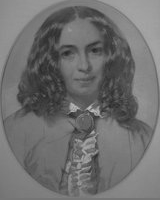 How
do I love thee? Let me count the ways.
How
do I love thee? Let me count the ways.
I love thee to the depth and breadth and height
My soul can reach, when feeling out of sight
For the ends of Being and Ideal Grace.
I love thee to the level of everyday's
Most quiet need, by sun and candle light.
I love thee freely, as men strive for Right;
I love thee purely, as they turn from Praise.
I love thee with the passion put to use
In my old griefs, and with my childhood's faith.
I love thee with a love I seem to lose
With my lost saints -- I love thee with the breath,
Smiles, tears, of all my life! -- and, if God choose,
I shall but love thee better after death.
Elizabeth Barrett Browning (1806 -
1861)

January 2006 James Allen "You will be what you
will to be.."
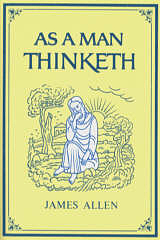
"You will be what you
will to be;
Let failure find it's
false content
In that poor word,
"Environment"
But Spirit scorns it,
and is free.
It masters time, it
conquers space;
It cows that boastful
trickster, Chance.
And bids the tyrant
Circumstance
Uncrown, and fill a
servants place.
The human Will, that
force unseen,
The offspring of
deathless Soul,
Can hew a way to any
goal,
Though walls of
granite intervene.
Be not impatient in
delay,
But wait as one who
understands;
When spirit rises and
commands,
The Gods are ready to
obey."
James Allen 1864-1912

As A
Man Thinketh -- FREE eBook -- timeless classic by James
Allen
Amazon.com "As A Man Thinketh"
December 2005 Dr. Bernie Segal, "We'll See"

"There is a man who has a farm, and his
whole livelihood depends on his horse to plow the field. One
day he is out plowing and suddenly the horse drops dead. The
people of the town say "That's very unfortunate." And the
man says, "We'll see."
A few days later somebody feels sorry
for him and gives him a horse for a gift. The townspeople
say, "You're a lucky man. And the man says, "We'll see."
A couple of days later the horse runs
away and everybody says, "You poor guy." And the man says,
"We'll see."
A few more days go by and the horse
returns with a second horse and everybody says, "What a
lucky guy." And the man says, "We'll see."
The man had never had two horses
before, so he and his son decided to go riding, and the boy
falls off one of the horses and breaks a leg. The
townspeople say, "Poor kid." And the man says "We'll see."
The next day the militia comes into
town grabbing young men for the army, but they leave the boy
behind because he has a broken leg. Everybody says, "What a
lucky kid." And the man says, "We'll see."
Dr. Bernie Siegel, Author, "Love, Medicine
and Miracles"
Nov 2005 Steve Jobs,
Commencement Address Stanford June 2005.Excerpts from,
Please see link for Complete Text.
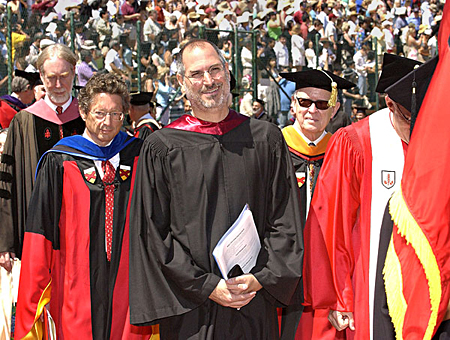 "I
am honored to be with you today at your commencement from
one of the finest universities in the world. I never
graduated from college. Truth be told, this is the closest
I've ever gotten to a college graduation. Today I want to
tell you three stories from my life. That's it. No big
deal. Just three stories.
"I
am honored to be with you today at your commencement from
one of the finest universities in the world. I never
graduated from college. Truth be told, this is the closest
I've ever gotten to a college graduation. Today I want to
tell you three stories from my life. That's it. No big
deal. Just three stories.
The first story is about connecting the
dots.
My second story is about love and loss.
My third story is about death."
"And the only way to do great work is to
love what you do."
"If today were the last day of my life,
would I want to do what I am about to do today?"
"Don't let the noise of others' opinions
drown out your own inner voice. And most important, have the
courage to follow your heart and intuition. They somehow
already know what you truly want to become. Everything else
is secondary. "
"Stay Hungry. Stay Foolish."
Steve Jobs, CEO Apple Computer and Pixar
Animation Studios, 12 Jun 2005

Complete text at Stanford Report
YouTube Video of Speech
Sept 2005 Og Mandino "I
will greet this day with love in my heart..."
Excerpt
from "The Greatest Secret in the World"
The Scroll Marked II...

"I
will greet this day with love in my heart...
For this is the greatest
secret of success in all ventures. Muscles can split a
shield and even destroy life itself but only the unseen
power of love can open the hearts of man. And until I master
this act I will remain no more than a peddler in the
marketplace. I will make love my greatest weapon and none on
who I call can defend upon its force... my love will melt
all hearts liken to the sun whose rays soften the coldest
day."
I will love all manners of
men for each has qualities to be admired even though they be
hidden.
I will love the ambitious
for they can inspire me.
I will love the failures for
they can teach me.
I will love the kings for
they are but human.
I will love the meek for
they are divine.
I will love the rich for
they are yet lonely.
I will love the poor for
they are so many
I will love the young for
the faith they hold.
I will love the old for
the wisdom they share.
I will love the beautiful
for their eyes of sadness.
I will love the ugly for
their souls of peace.
And most of all I will
love myself.
For when I do I will
zealously inspect all things which enter my body, my
mind, my soul and my heart. Never will I overindulge the
requests of my flesh, rather I will cherish my body with
cleanliness and moderation. Never will I allow my mind
to be attracted to evil and despair, rather I will
uplift it with the knowledge and wisdom of the ages.
Never will I allow my soul to become complacent and
satisfied, rather I will feed it with meditation and
prayer. Never will I allow my heart to become small and
bitter, rather I will share it and it will grow and warm
the earth.
Og Mandino, "the Greatest Secret in the
World"
The Scroll Marked II


August 2005 "Adventure"
Gandalf and Bilbo, the Hobbit.
''Very pretty!' said Gandalf. 'But I have
no time to blow smoke-rings this morning. I am looking for
someone to share in an adventure that I am arranging, and
it's very difficult to find anyone.'
'I should think so – in these parts! We
are plain quiet folk and have no use for adventures. Nasty
disturbing uncomfortable things! Make you late for dinner! I
can't think what anybody sees in them,' said our Mr.
Baggins. ....'We don't want any adventures here, thank you!
You might try over The Hill or across The Water.' "
THE HOBBIT
OR
THERE AND BACK AGAIN
J. R. R. TOLKIEN
CHAPTER I
AN UNEXPECTED PARTY
July 2005 Rudyard Kipling
"If.."
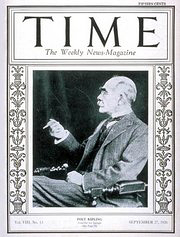 If
you can keep your head when all about you
If
you can keep your head when all about you
Are losing theirs and blaming it on you,
If you can trust yourself when all men doubt you,
But make allowance for their doubting too;
If you can wait and not be tired
by waiting,
Or being lied about, don't deal in lies,
Or being hated, don't give way to hating,
And yet don't look too good, nor talk too wise:
If you can dream - and not make
dreams your master;
If you can think - and not make thoughts your aim;
If you can meet with Triumph and Disaster
And treat those two impostors just the same;
If you can bear to hear the
truth you've spoken
Twisted by knaves to make a trap for fools,
Or watch the things you gave your life to broken,
And stoop and build 'em up with wornout tools:
If you can make one heap of all
your winnings
And risk it on one turn of pitch-and-toss,
And lose, and start again at your beginnings
And never breathe a word about your loss;
If you can force your heart and
nerve and sinew
To serve your turn long after they are gone,
And so hold on when there is nothing in you
Except the Will which says to them: 'Hold on!'
If you can talk with crowds and
keep your virtue,
Or walk with kings - nor lose the common touch,
If neither foes nor loving friends can hurt you,
If all men count with you, but none too much;
If you can fill the unforgiving
minute
With sixty seconds' worth of distance run -
Yours is the Earth and everything that's in it,
And - which is more - you'll be a Man my son!
Rudyard Kipling 1865-1936
English Writer and Poet
From "Rewards and Fairies" 1910
THE KIPLING SOCIETY

If—
Background of the
Poem
From Wikipedia, the free
encyclopedia.
June 2005 John Donne
"No Man is an Island" "Death Be Not Proud"
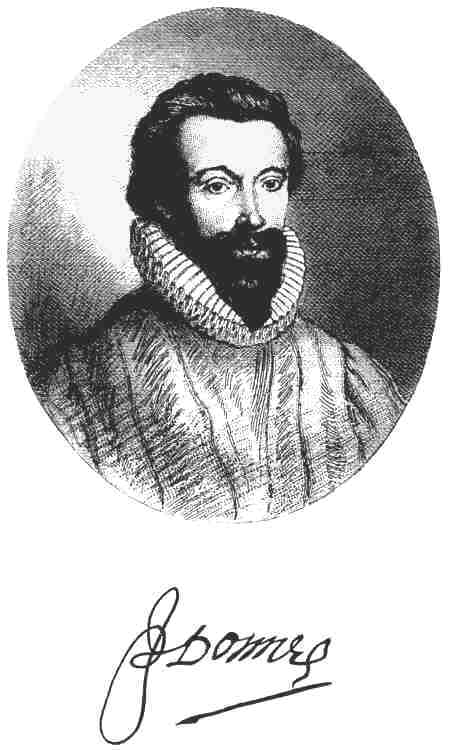 Devotions
Upon Emergent Occasions, 1624
Devotions
Upon Emergent Occasions, 1624
Meditation 17 (Excerpt From)
Nuc lento sonitu
dicunt, morieris.
Now this bell tolling softly for another, says to me,
Thou must die.
...No man is an
island, entire of itself; every man is a piece of
the continent, a part of the main. If a clod be
washed away by the sea, Europe is the less, as well
as if a promontory were, as well as if a manor of
thy friend's or of thine own were. Any man's death
diminishes me, because I am involved in mankind; and
therefore never send to know for whom the bell
tolls; it tolls for thee...
John Donne
(1573-1631)
Inspiration for Hemingway's
"For Whom the Bell Tolls"
Wikipedia "For Whom the Bell Tolls"
Complete Text of Meditation 17 with annotations
Holy Sonnet 10 "Death Be
Not Proud"
Death, be not proud, though
some have called thee
Mighty and dreadful, for thou art not so;
For those whom thou think'st thou dost overthrow,
Die not, poor Death, nor yet canst thou kill me.
From rest and sleep, which but thy pictures be,
Much pleasure; then from thee much more must flow,
And soonest our best men with thee do go,
Rest of their bones, and soul's delivery.
Thou art slave to fate, chance, kings, and desperate men,
And dost with poison, war, and sickness dwell;
And poppy or charms can make us sleep as well
And better than thy stroke; why swell'st thou then?
One short sleep past, we wake eternally,
And death shall be no more; Death, thou shalt die.
John Donne (1573-1631)
John Donne
Society
Wikepedia
"John Donne"
John Donne Poems at Poetseers.
org
Complete
Works of John Donne at The Literature Network with
Biography
May 2005 George Washington
"Washington's Order on Profanity"
General Orders
3 August 1776
 The
following General Orders, issued to the Continental army at
New York abut three weeks before the Battle of Long Island
and known as Washington's order on profanity, is adapted
from The Papers of George Washington, Revolutionary War
Series, vol. 5, pp. 551-52. Varick transcript, Library of
Congress, Washington, D.C., Washington Papers.
The
following General Orders, issued to the Continental army at
New York abut three weeks before the Battle of Long Island
and known as Washington's order on profanity, is adapted
from The Papers of George Washington, Revolutionary War
Series, vol. 5, pp. 551-52. Varick transcript, Library of
Congress, Washington, D.C., Washington Papers.
Head
Quarters, New York, August 3rd 1776.
Parole
Uxbridge. Countersign Virginia
That the
Troops may have an opportunity of attending public worship,
as well as take some rest after the great fatigue they have
gone through; The General in future excuses them from
fatigue duty on Sundays (except at the Ship Yards, or
special occasions) until further orders.[1] The
General is sorry to be informed that the foolish, and wicked
practice, of profane cursing and swearing (a Vice heretofore
little known in an American Army) is growing into fashion;
he hopes the officers will, by example, as well as
influence, endeavour to check it, and that both they, and
the men will reflect, that we can have little hopes of the
blessing of Heaven on our Arms, if we insult it by our
impiety, and folly; added to this, it is a vice so mean and
low, without any temptation, that every man of sense, and
character, detests and despises it.
Clarkson and
Chase under confinement for Desertion, and reenlistment into
the Artillery, from another Corps, to return to Capt:
Bauman's Company until Col. Ellmores Regiment, who claims
them, comes into camp.
1.
This order was rescinded in the General Orders of 25 August
1776: "The General Order against working on Sunday is
revoked the time not admitting of any delay" (Revolutionary
War Series, vol. 5, p. 125).
Can Be found at
The
Papers of George Washington, Site Maintained by Alderman
Library, University of Virginia

April 2005
Kalidasa Indian Poet "The Salutation of the Dawn"
THE SALUTATION OF THE DAWN
Listen to the Exhortation of the Dawn!
Look to this day.
For it is life, the very life of life.
In its brief course lie all the verities and realities of
your existence.
The bliss of growth;
The glory of action;
The splendor of beauty;
For yesterday is already a dream,
and tomorrow is only a vision;
But today well lived, makes every yesterday
A dream of happiness, and every tomorrow a vision of hope.
Look well, therefore, to this day!
Such is the salutation of the Dawn.
Kalidasa, Indian Poet,
Choice of the Season, Sanskrit Sloka
March 2005 R. L. Sharp "A
Bag of Tools"
Isn't it
strange that princes and kings,
And
clowns that caper in sawdust rings,
And
common folks like you and me
Are
builders for Eternity.
Each is given a bag of tools,
A
shapeless mass and a book of rules,
And
each must make, ere life is flown,
A
stumbling block or a stepping stone.
R.L
Sharp, Freelance Writer (1870-1950)
From the book Masterpieces of
Religion Verse, edited by James Dalton Morrison (Harper,
1948) and Poems that Touch the Heart, which was
compiled by A. L. Alexander (Doubleday, 1941 and 1956).
"Best Loved Poems of the American People" (selected
by Hazel Felleman, Doubleday & Co., 1936).
On Denton Cooley's Statue, Texas Heart
Institute, Houston, Texas.
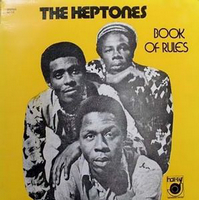 Poem
was Inspiration for
"Book of Rules" by The Heptones Caribbean
Reggae Band 1973 YouTube
Poem
was Inspiration for
"Book of Rules" by The Heptones Caribbean
Reggae Band 1973 YouTube
Listen to
"Book of Rules" Song Sample Here
"Book
of Rules" was Rerecorded by Bobby & The Midnites - Bob Weir
1981 (Pre Grateful Dead) Historical Review of
Song
February 2005
Douglas MacArthur "Duty, Honor, Country" Excerpt From
Delivered to the Corps of Cadets 12 May 1962, West Point, NY.
One of the Top 100 Speeches of all Time!
|
Duty, Honor,
Country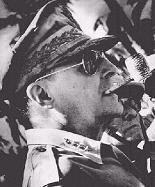
Those three hallowed words reverently dictate
what you ought to be, what you can be, what you
will be. They are your rallying points: to build
courage when courage seems to fail; to regain
faith when there seems to be little cause for
faith; to create hope when hope becomes forlorn.
Unhappily, I possess neither that eloquence of
diction, that poetry of imagination, nor that
brilliance of metaphor to tell you all that they
mean. The unbelievers will say they are but
words, but a slogan, but a flamboyant phrase.
Every pedant, every demagogue, every cynic,
every hypocrite, every troublemaker, and I am
sorry to say, some others of an entirely
different character, will try to downgrade them
even to the extent of mockery and ridicule.
But
these are some of the things they do. They build
your basic character. They mold you for your
future roles as the custodians of the nation's
defense. They make you strong enough to know
when you are weak, and brave enough to face
yourself when you are afraid. They teach you to
be proud and unbending in honest failure, but
humble and gentle in success; not to substitute
words for actions, not to seek the path of
comfort, but to face the stress and spur of
difficulty and challenge; to learn to stand up
in the storm but to have compassion on those who
fall; to master yourself before you seek to
master others; to have a heart that is clean, a
goal that is high; to learn to laugh, yet never
forget how to weep; to reach into the future yet
never neglect the past; to be serious yet never
to take yourself too seriously; to be modest so
that you will remember the simplicity of true
greatness, the open mind of true wisdom, the
meekness of true strength. They give you a
temper of the will, a quality of the
imagination, a vigor of the emotions, a
freshness of the deep springs of life, a
temperamental predominance of courage over
timidity, an appetite for adventure over love
of ease. They create in your heart the sense of
wonder,
the unfailing hope of what next, and the
joy and inspiration of life. They teach you in
this way to be an officer and a gentleman.
Please Read remainder of speech and .pdf and MP3
File at
American Rhetoric.com |
Download MP3 File of Speech
Right Click and "Save As"
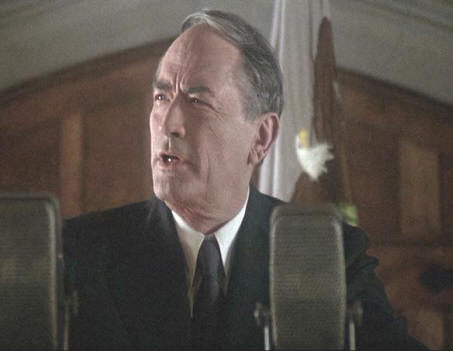
Listen to Gregory Peck in "MacArthur" 1977
Portions of the Speech.
January 2005
Sir William Osler M.D. "A Way of Life"
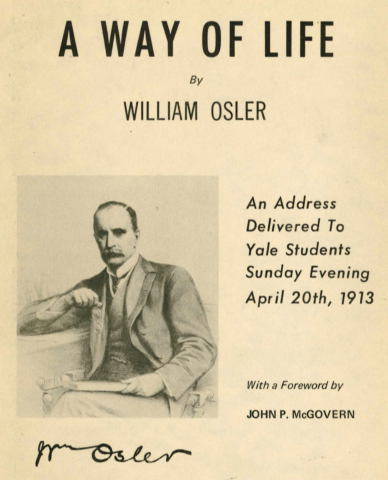
"Now the way of life that I preach is a
habit to be acquired gradually by long and steady
repetition.
It is the practice of living for the
day only, and for the day's work, Life
in Day-Tight Compartments...
Touch a button and hear, at every level
of your life,
the iron doors shutting out
The Past...the dead yesterdays.
Touch another and shut off, with a
metal curtain,
The Future...the unborn tomorrows.
Then you are safe for today.
The load of tomorrow added to that of
yesterday, carried today makes the strongest falter.
William Osler April 1913
"Each day needs that shalt thou ask, Each day will set it's proper
task." Goethe

See
Dr. Christian's
Collection of this Address for a full copy!
THE EVOLUTION OF
MODERN MEDICINE
by WILLIAM OSLER
CHAPTER VI
December 2004 Leo Tolstoy "What Men Live By" "The Three Lessons of God"
paraphrased..
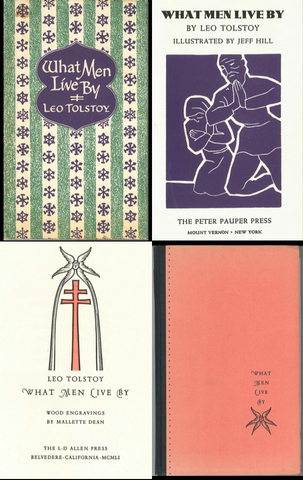
Learn, "What dwells in man".
Love has been given to men
To dwell in their hearts.
Learn, "What is not given to man".
It is not given to men
To know their own needs.
Learn, "What Men Live
By".
Man does not live by care for himself
But by the love for them that is in
other's
hearts.
God does not wish men to live apart, and
therefore he does not reveal to them what each one needs for
himself; but he wishes them to live united, and therefore
reveals to each of them that
they are needful to each other's Happiness.
Leo Tolstoy 1828-1910
View, Download and Print a .pdf Version of "What Men
Live By"
Version at Christian Classics
Ethereal Library
"What Men Live By"
Dr. Christian has several collectable out of
print versions of this classic and moving short story by Leo
Tolstoy written in 1881. Most of these have beautiful
illustrations. Check out his
"What Men LIve By" Web Page for more details and excerpts/artwork from these versions.

November 2004 Martin
Buber
"There are those who suffer greatly,
and cannot tell what is in their hearts,
and they go their way full of suffering.
But
If they meet someone,
Whose face is bright with laughter,
He can quicken them with Gladness.
And
It is no small thing to Quicken a Human
Being..."
Martin Buber 1878-1965
Jewish philosopher, theologian, bible
translator, writer, poet
Martin
Buber Homepage
October
2004 Benjamin Franklin "on Death"
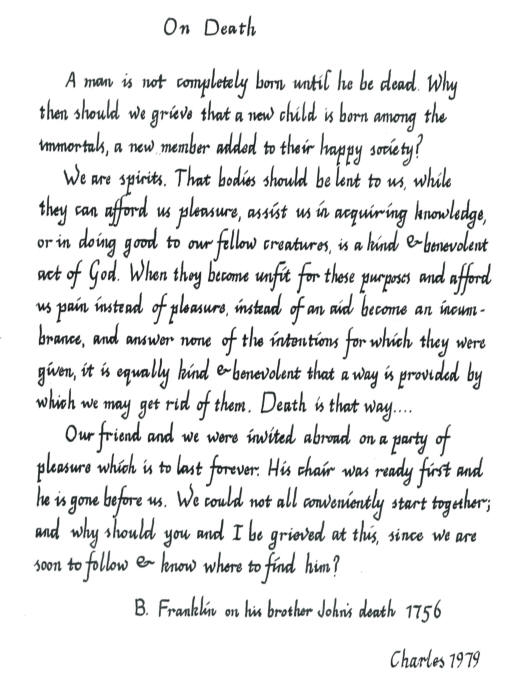 "A man is not
completely born until he be dead. Why then should we
grieve that a new child is born among the immortals, a new
member added to their happy society?
"A man is not
completely born until he be dead. Why then should we
grieve that a new child is born among the immortals, a new
member added to their happy society?
We are spirits.
That bodies should be lent to us, while they can afford us
pleasure, assist us in acquiring knowledge, or in doing good
to our fellow creatures, is a kind and benevolent act of
God. When they become unfit for these purposes and
afford us pain instead of pleasure, instead of an aid become
an encumbrance, and answer none of the intentions for which
they were given, it is equally kind and benevolent that a
way is provided by which we may get rid of them. Death
is that way..
Our friend and we were
invited abroad on a party of pleasure which is to last
forever. His chair was ready first and he is gone
before us. We could all not conveniently start
together; and why should you and I be grieved at this, since
we are soon to follow and know where to find him?"
Ben Franklin on his brother John's death
1756
On Death.pdf,
Dr. Christian, Calligraphy
Version
September 2004 Marianne Williamson "Our Deepest Fear"
Our deepest fear is not that we are
inadequate. Our deepest fear is that we are powerful beyond
measure. It is our light, not our darkness that most
frightens us. We ask ourselves, Who am I to be brilliant,
gorgeous, talented, fabulous? Actually, who are you not to
be? You are a child of God. Your playing small does not
serve the world. There is nothing enlightened about
shrinking so that other people won't feel insecure around
you.
We are all
meant to shine, as children do. We were born to make
manifest the glory of God that is within us. It is not just
in some of us; it is in everyone. And as we let our own
light shine, we unconsciously give other people permission
to do the same. As we are liberated from our own fear, our
presence automatically liberates others."From:
A Return To Love: Reflections on the Principles of A Course
in Miracles Harper Collins, 1992 (from Chapter 7, Section 3)
Link to 1992 Abridged Audio version Link to Paperback
Reprint, 1996 edition by Marianne Williamson.
.August 2004
Audrey Hepburn on Beauty
For attractive lips, speak
words of kindness.
For lovely eyes, seek out
the good in people.
For a slim figure,
share your food with the
hungry.
For beautiful hair, let a
child run his fingers through it once a day.
For poise, walk with the
knowledge you'll never walk alone.
People, even more than
things, have to be restored, renewed, revived, reclaimed,
redeemed, and redeemed.
Never throw out anybody.
Remember, if you ever need
a helping hand, you'll find one at the end of your arm.
As you grow older, you
will discover that you have two hands, one for helping
yourself, the other for helping others.
Audrey Hepburn
Other Fine Services & Products t
Premium Services & Products to
Complement Your Quest
for a New Level of Health, Strength & Appearance!
You will be Exercising Less and
Eating More and learn to live
"The Inside Outside Way of Life!"
The
Poster! "The Inside Outside Way of Life"






Scan Inside Outside on Your Mobile Phone!!

Custom QR
Codes made by
QRlicious!
Hi-Lo Strength Training,
Zone/Paleo/Bulk/Lo-Carb/Ketosis Nutrition,
DXA Bone Density,
DXA Body Composition
Botox,
Diamond Microdermabrasion,
VI
Superficial Peel,
Rejuvapen
Treatments
The Best of Each In San Antonio!





















Methodist Plaza
4499 Medical Drive #225
San Antonio, Texas 78229
Call 210.616.0836 to Schedule Your
Free Consultation
Visit us
at Facebook! Become a Fan!

Scan a
Google
Map to Inside Outside

Custom QR
Codes made by
QRlicious!
Questions/Comments/Suggestions/Complaints
Please Email Us
iocontact@insideoutsidespa.com or
Use Our
Contact Form
Sign up
for our Newsletter!
Return to
Inside Outside Home Page





 misterrogers.org
misterrogers.org











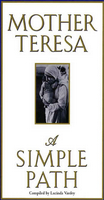













 “You
live like this, sheltered, in a delicate world, and you
believe you are living. Then you read a book (Lady
Chatterley, for instance), or you take a trip, or you talk
with Richard, and you discover that you are not living, that
you are hibernating.
“You
live like this, sheltered, in a delicate world, and you
believe you are living. Then you read a book (Lady
Chatterley, for instance), or you take a trip, or you talk
with Richard, and you discover that you are not living, that
you are hibernating. 




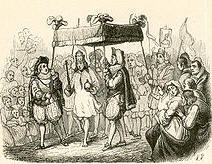


 "Until
one is committed there is hesitancy,
"Until
one is committed there is hesitancy, 

 “TWO
YEARS ago I came across a formula for success which has
revolutionized my life. It was so simple, and so obvious
once I had seen it, that I could hardly believe it was
responsible for the magical results which followed my
putting it into practice.
“TWO
YEARS ago I came across a formula for success which has
revolutionized my life. It was so simple, and so obvious
once I had seen it, that I could hardly believe it was
responsible for the magical results which followed my
putting it into practice. Out
of the night that covers me,
Out
of the night that covers me,



 "The
only answer I can see, Jonathan, is that you are pretty well
a
"The
only answer I can see, Jonathan, is that you are pretty well
a



 Alice's
Adventure in Wonderland
Alice's
Adventure in Wonderland



 Thomas
Parke D'Invilliers
is both a pen name of Francis Scott
Fitzgerald and a character in his
quasi-autobiographical first novel, This
Side Of Paradise. In the novel,
D'Invilliers represents the poet John Peale
Bishop, a friend of Fitzgerald's at
Princeton and a member of the class of 1917.
Thomas
Parke D'Invilliers
is both a pen name of Francis Scott
Fitzgerald and a character in his
quasi-autobiographical first novel, This
Side Of Paradise. In the novel,
D'Invilliers represents the poet John Peale
Bishop, a friend of Fitzgerald's at
Princeton and a member of the class of 1917.











 How
do I love thee? Let me count the ways.
How
do I love thee? Let me count the ways.


 "I
am honored to be with you today at your commencement from
one of the finest universities in the world. I never
graduated from college. Truth be told, this is the closest
I've ever gotten to a college graduation. Today I want to
tell you three stories from my life. That's it. No big
deal. Just three stories.
"I
am honored to be with you today at your commencement from
one of the finest universities in the world. I never
graduated from college. Truth be told, this is the closest
I've ever gotten to a college graduation. Today I want to
tell you three stories from my life. That's it. No big
deal. Just three stories. 


 If
you can keep your head when all about you
If
you can keep your head when all about you Devotions
Upon Emergent Occasions, 1624
Devotions
Upon Emergent Occasions, 1624 The
following General Orders, issued to the Continental army at
New York abut three weeks before the Battle of Long Island
and known as Washington's order on profanity, is adapted
from The Papers of George Washington, Revolutionary War
Series, vol. 5, pp. 551-52. Varick transcript, Library of
Congress, Washington, D.C., Washington Papers.
The
following General Orders, issued to the Continental army at
New York abut three weeks before the Battle of Long Island
and known as Washington's order on profanity, is adapted
from The Papers of George Washington, Revolutionary War
Series, vol. 5, pp. 551-52. Varick transcript, Library of
Congress, Washington, D.C., Washington Papers.

































